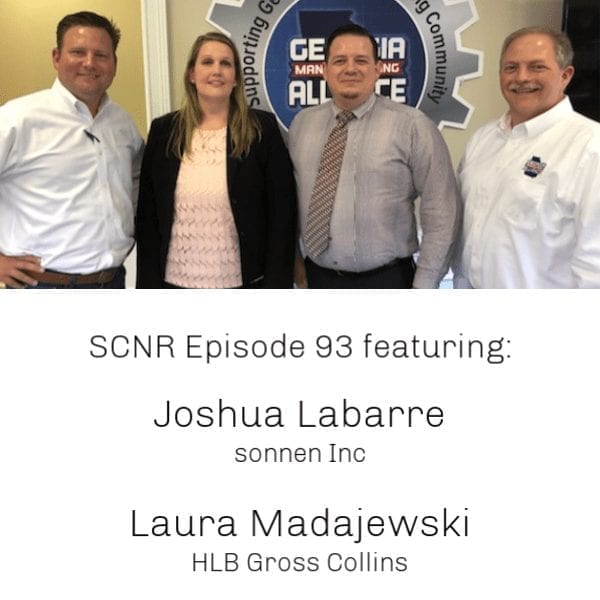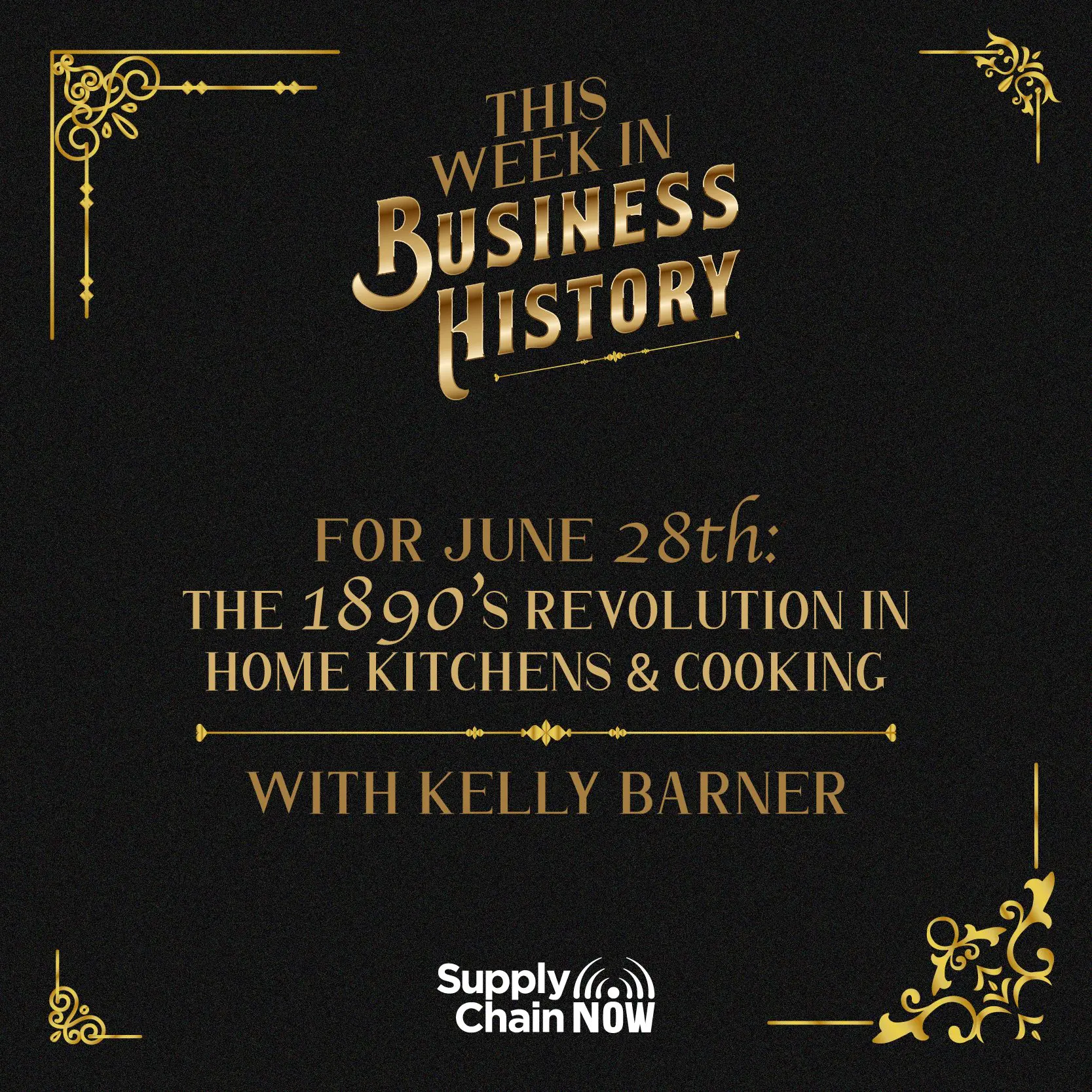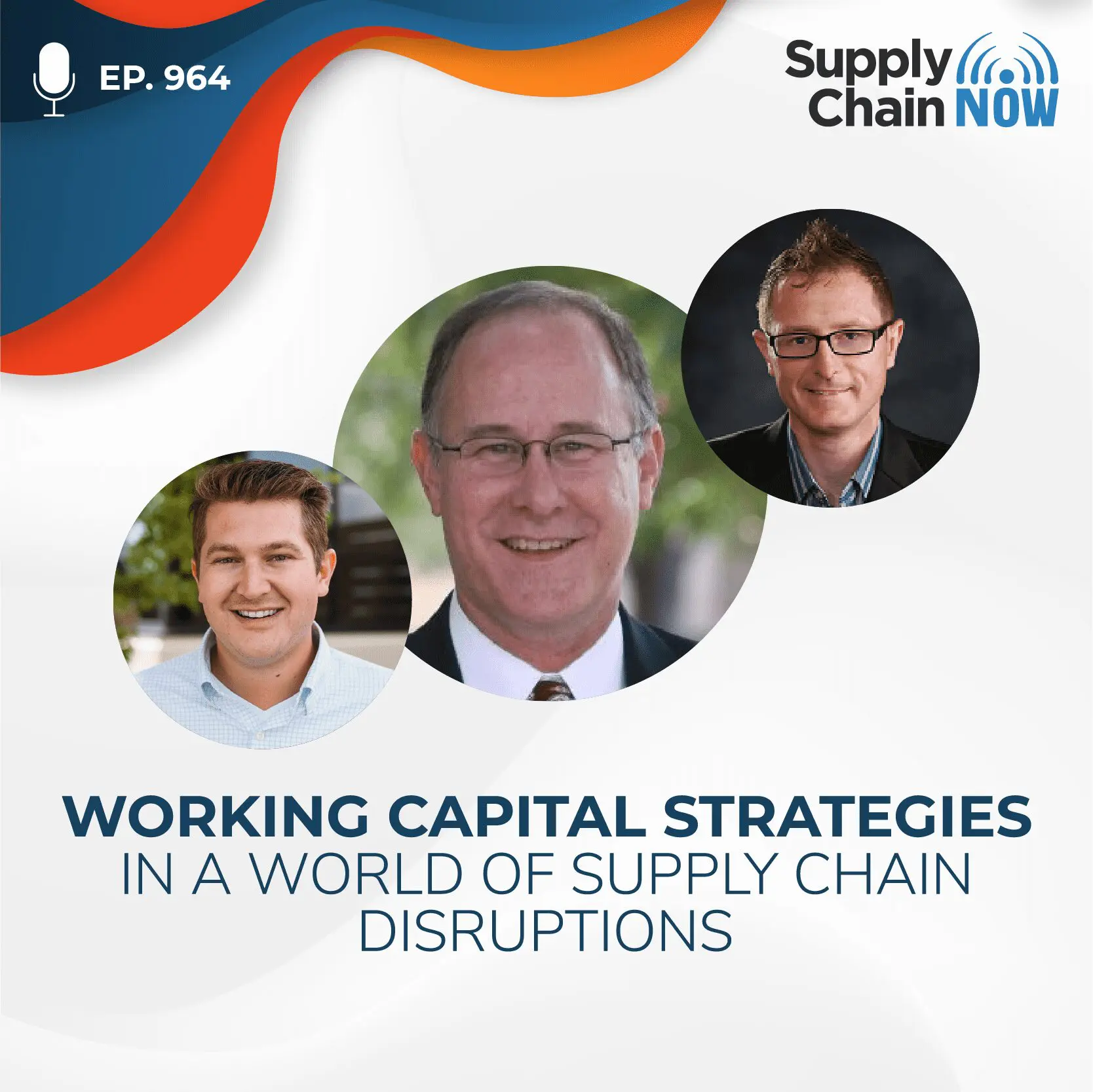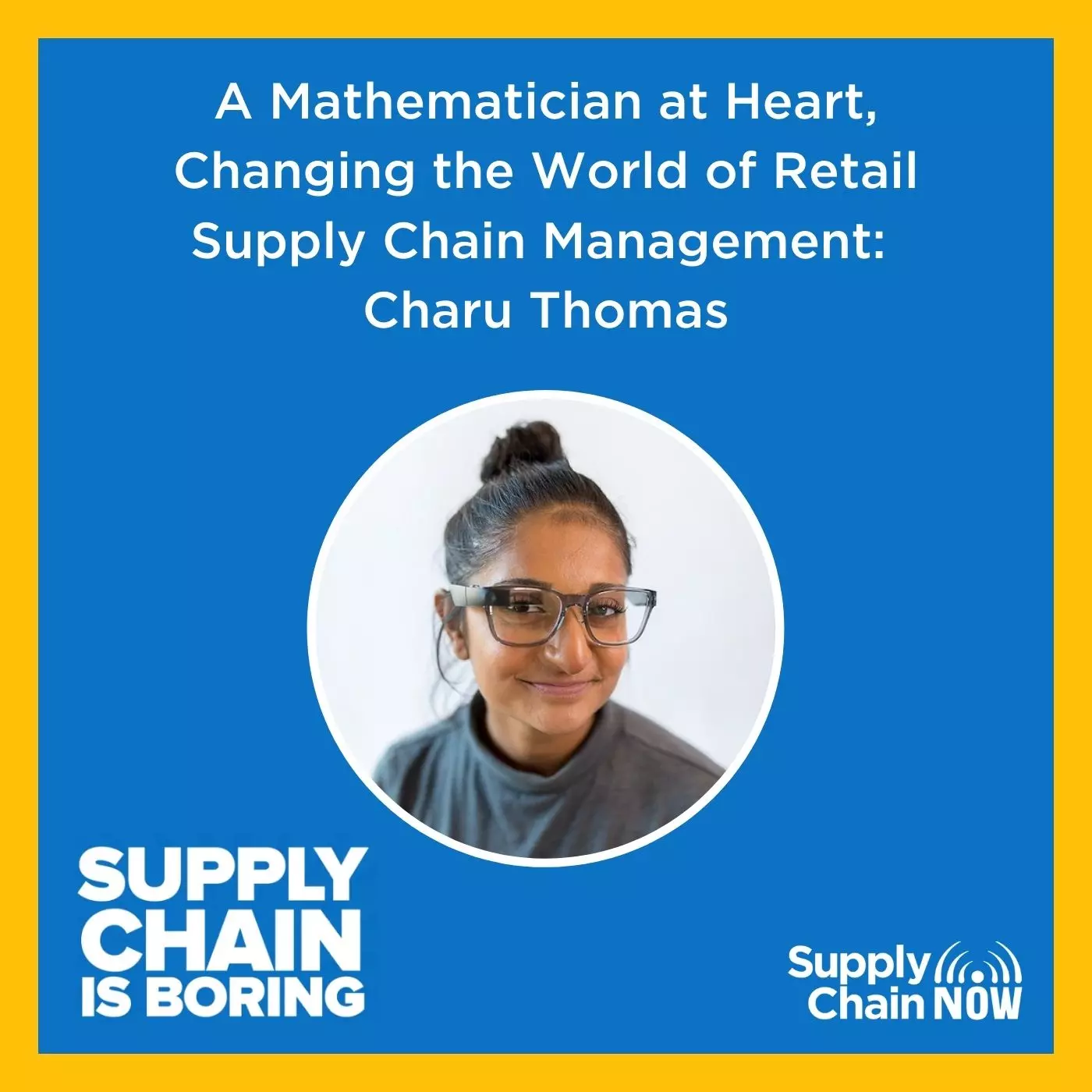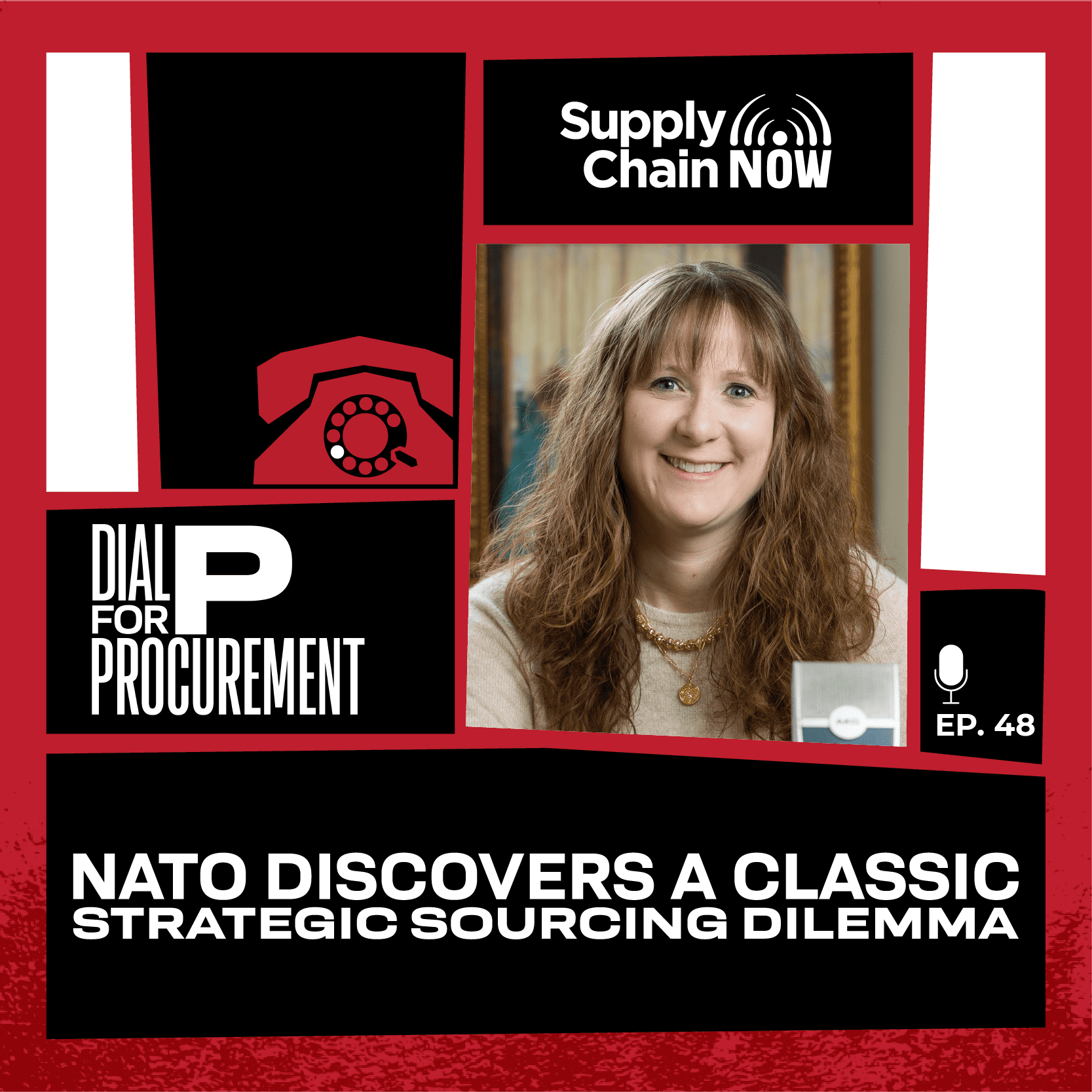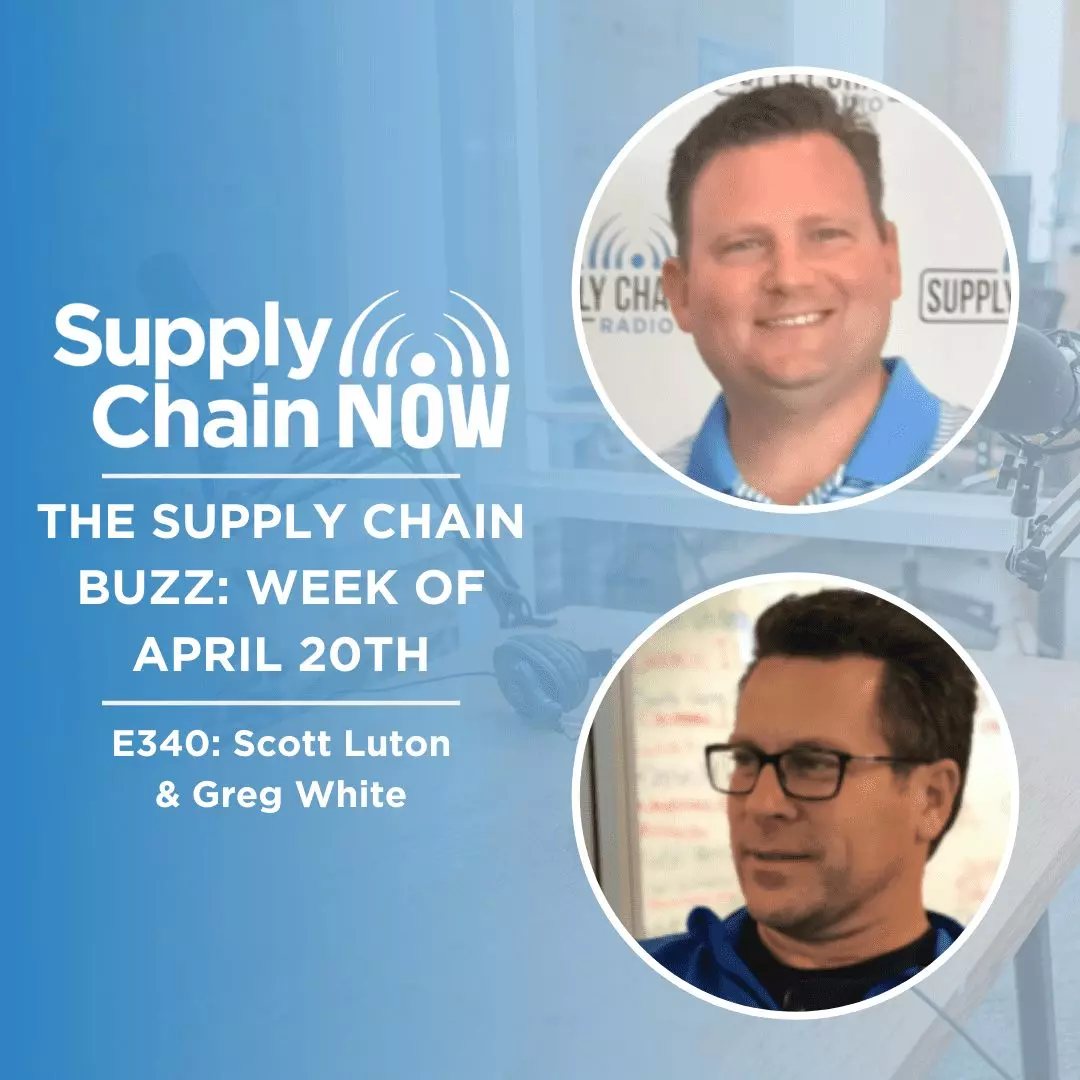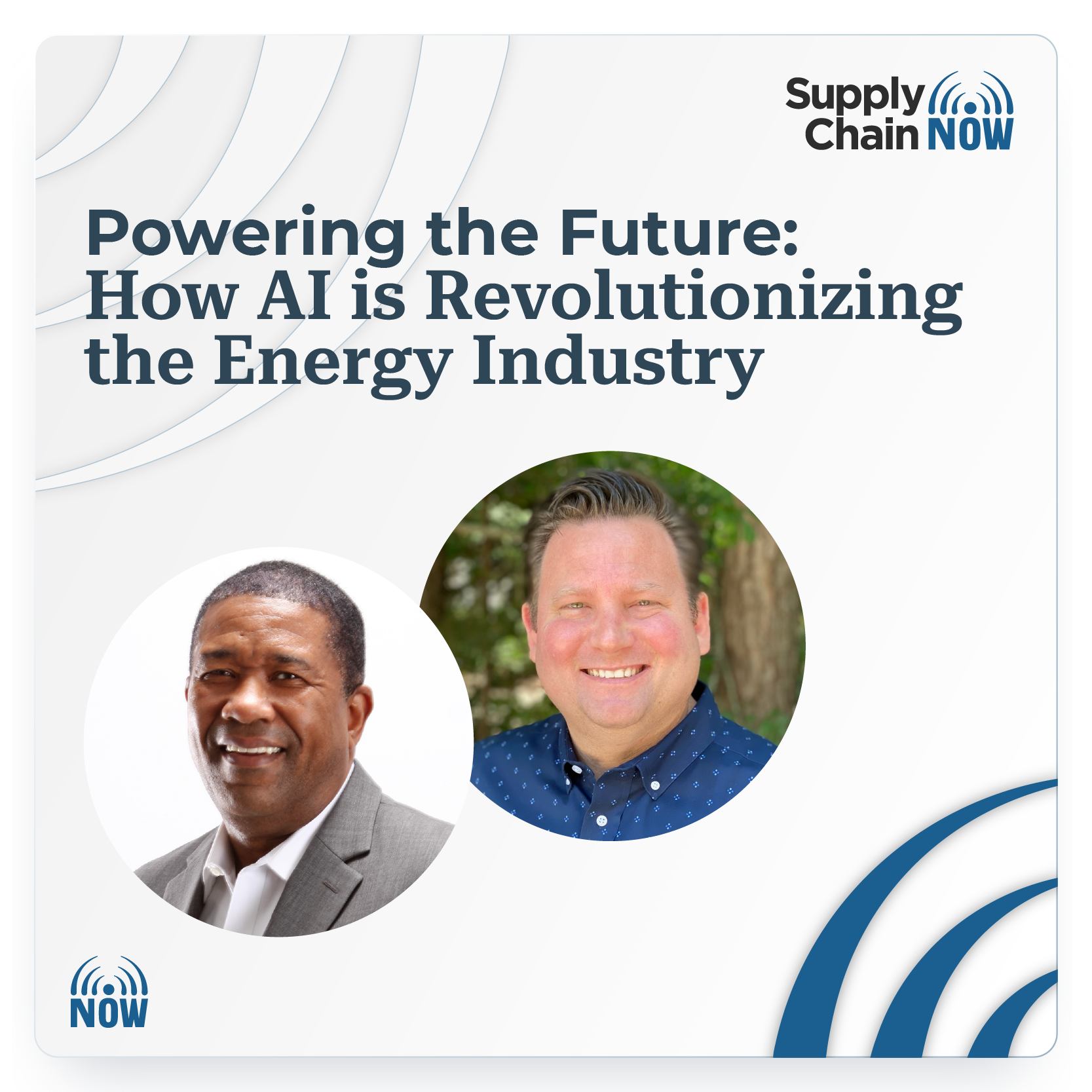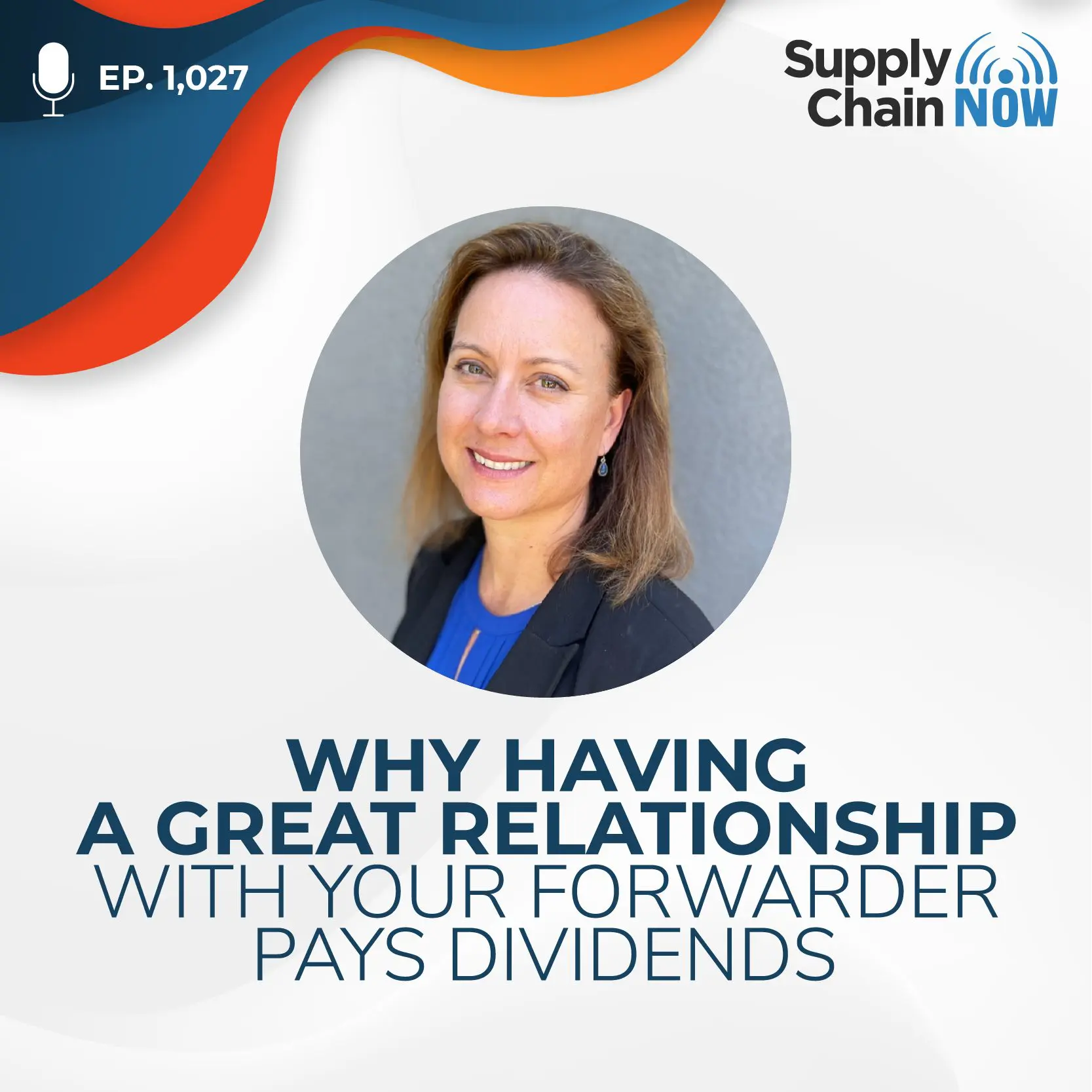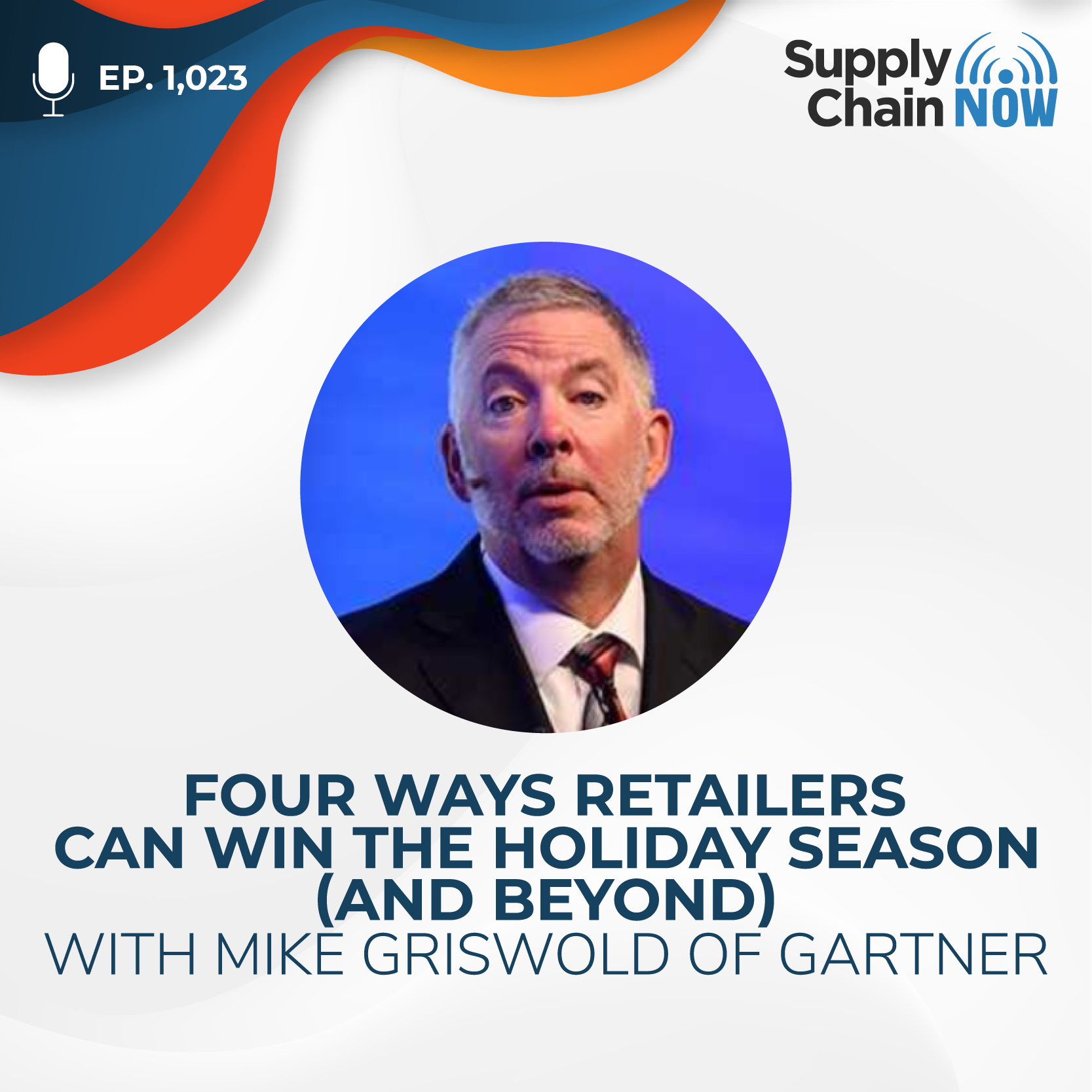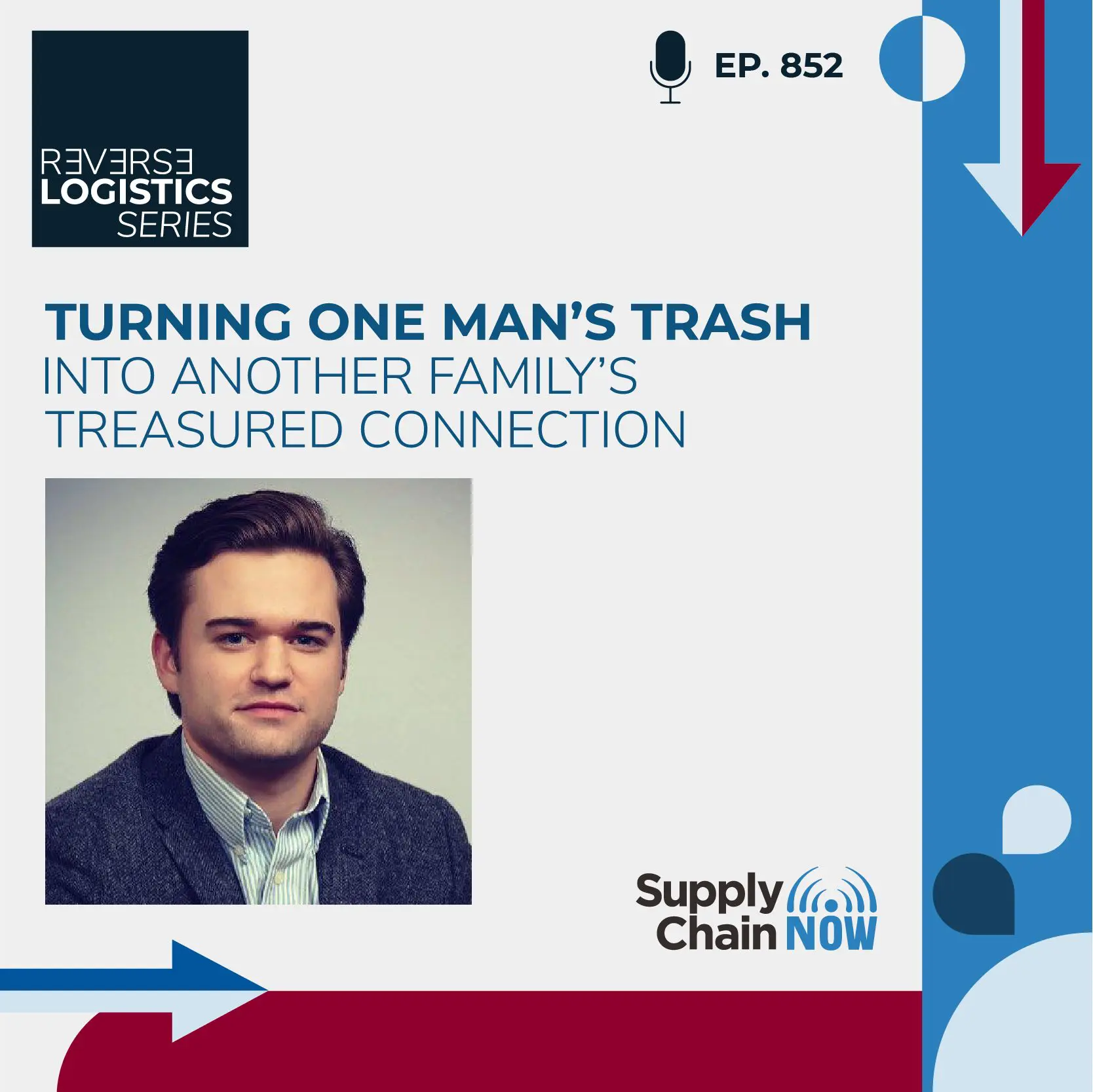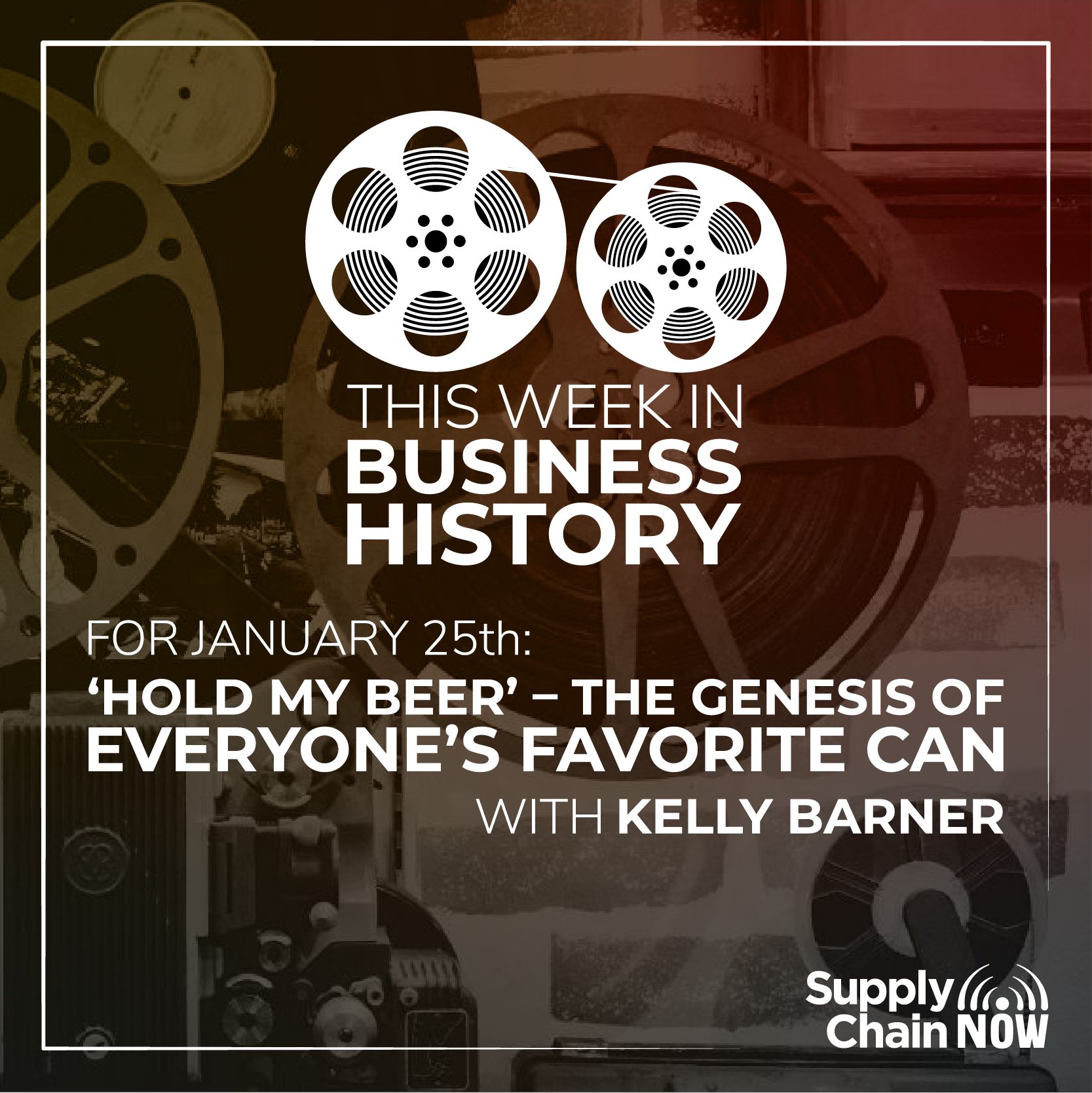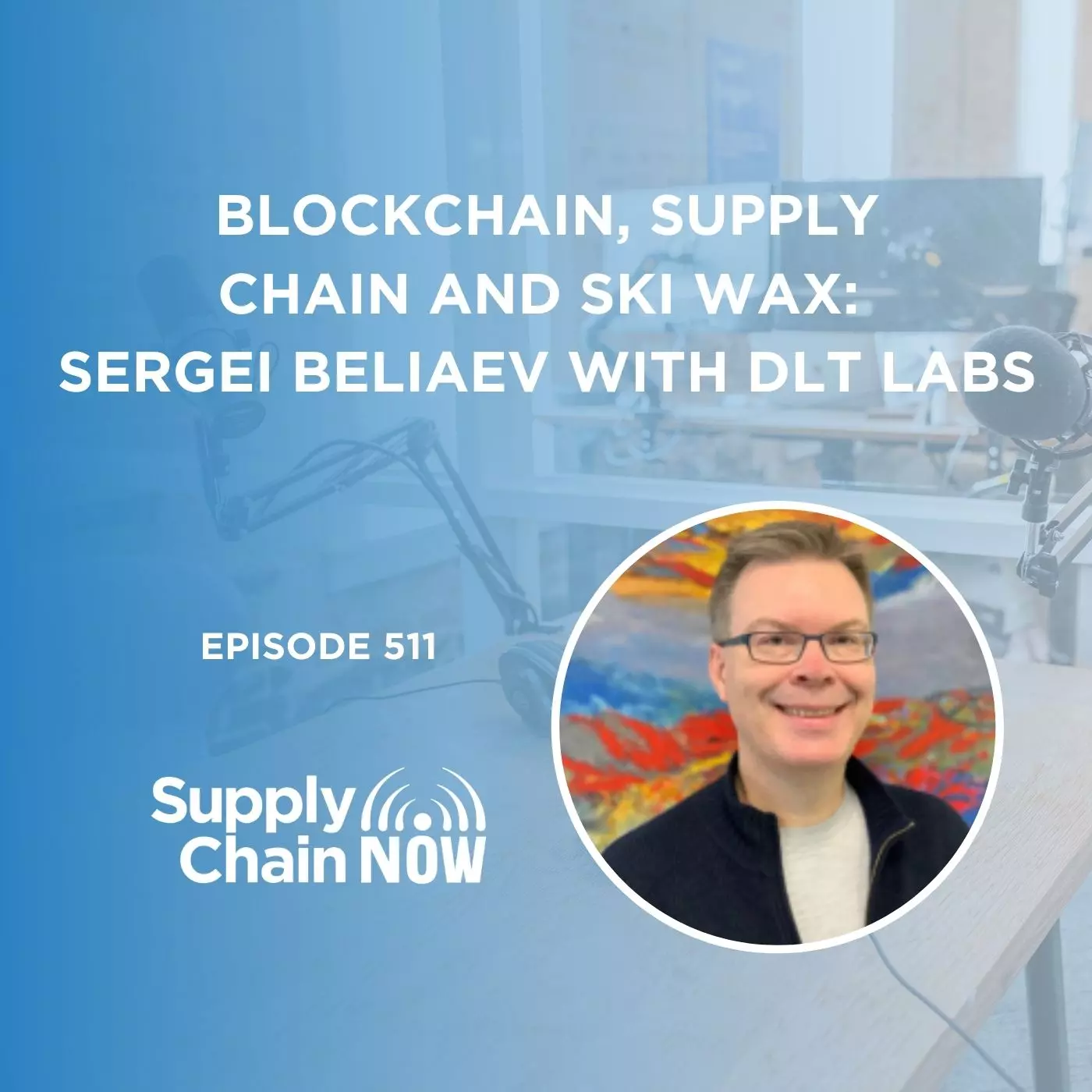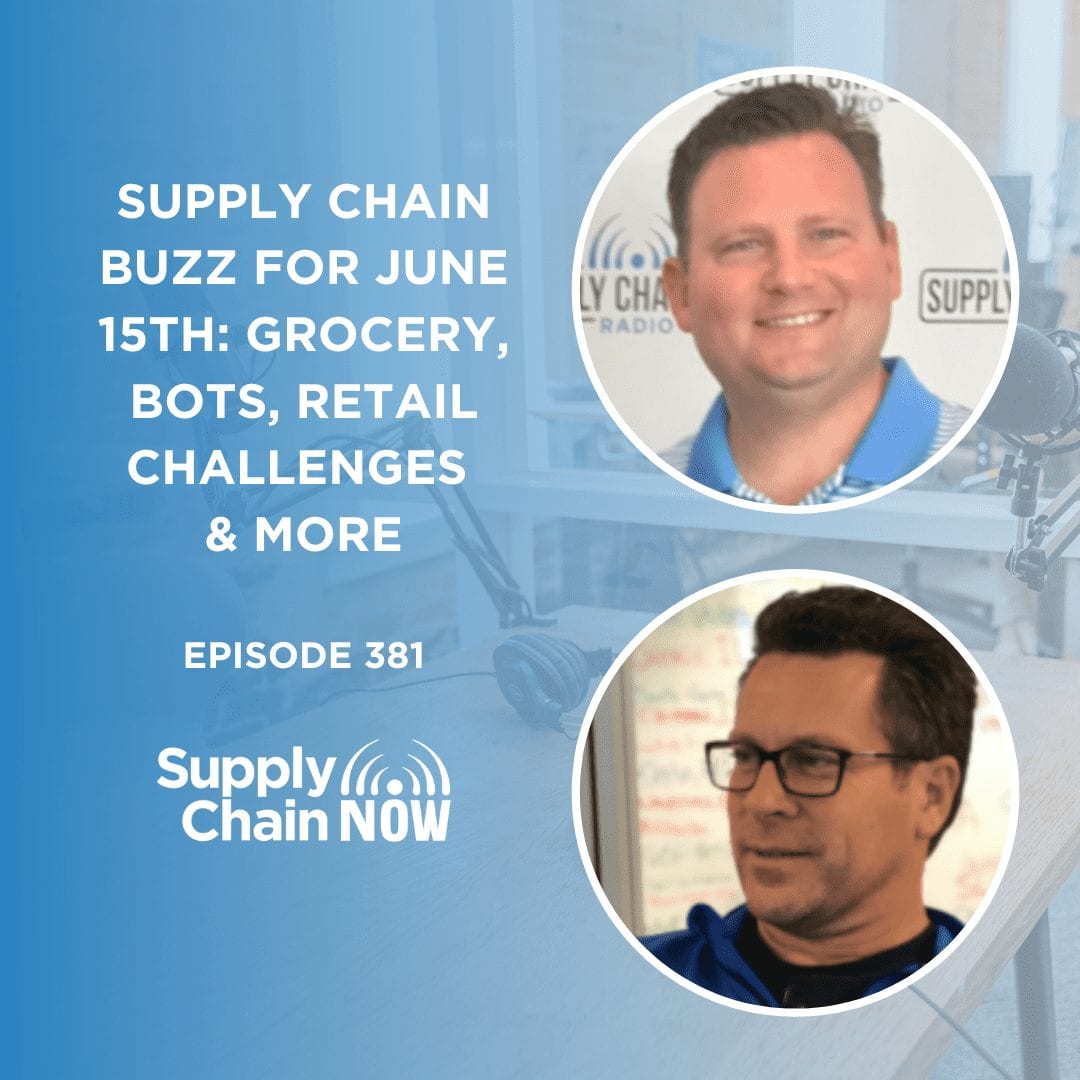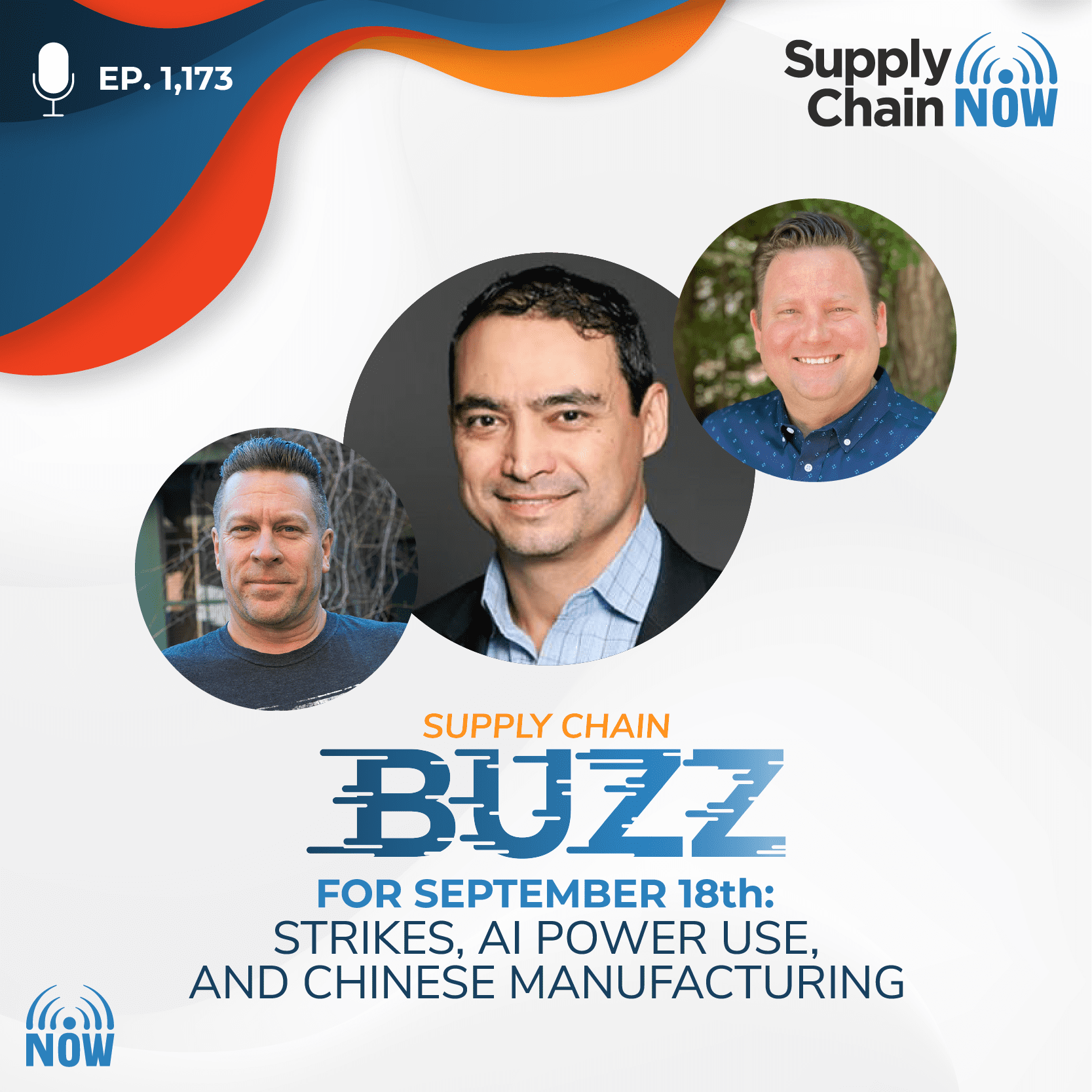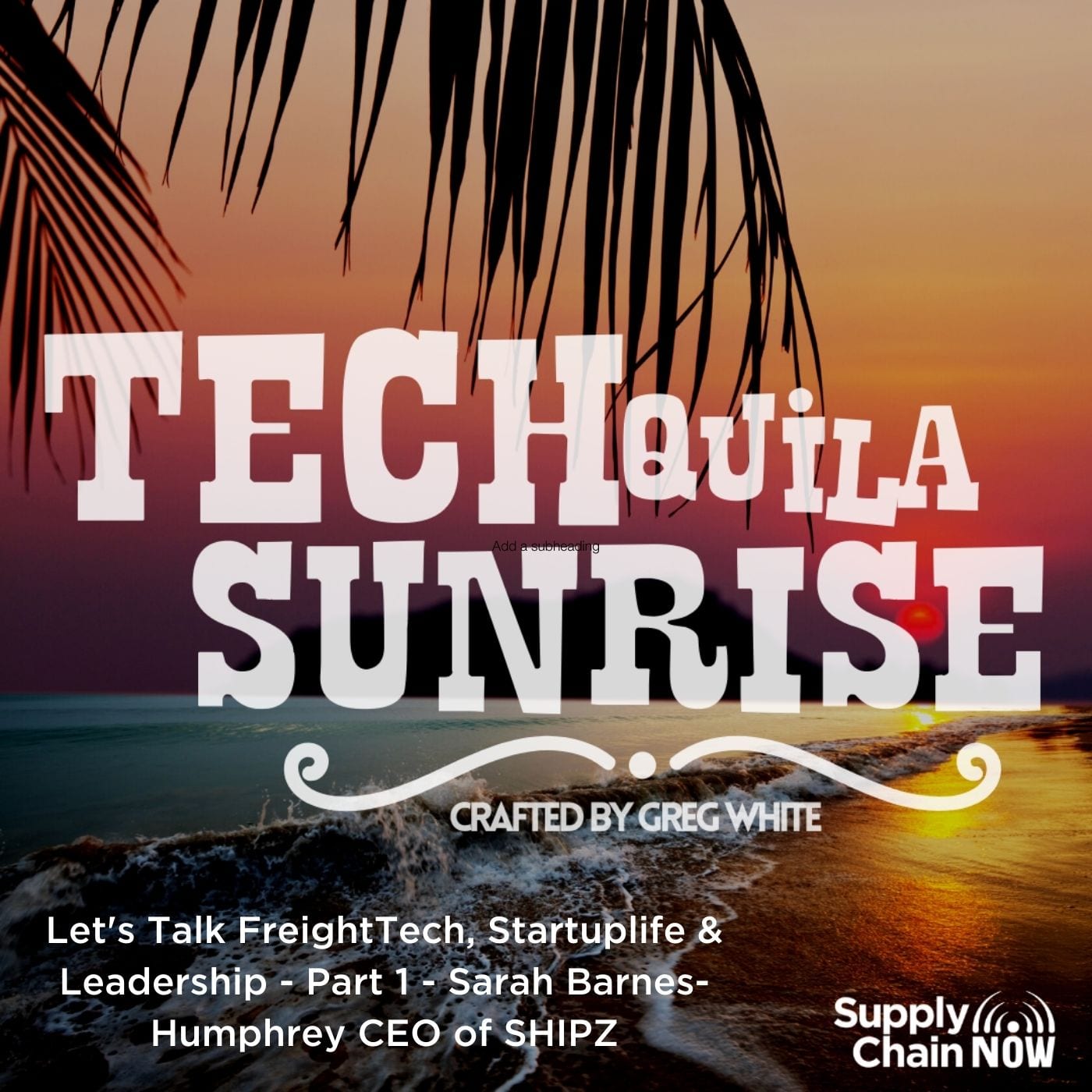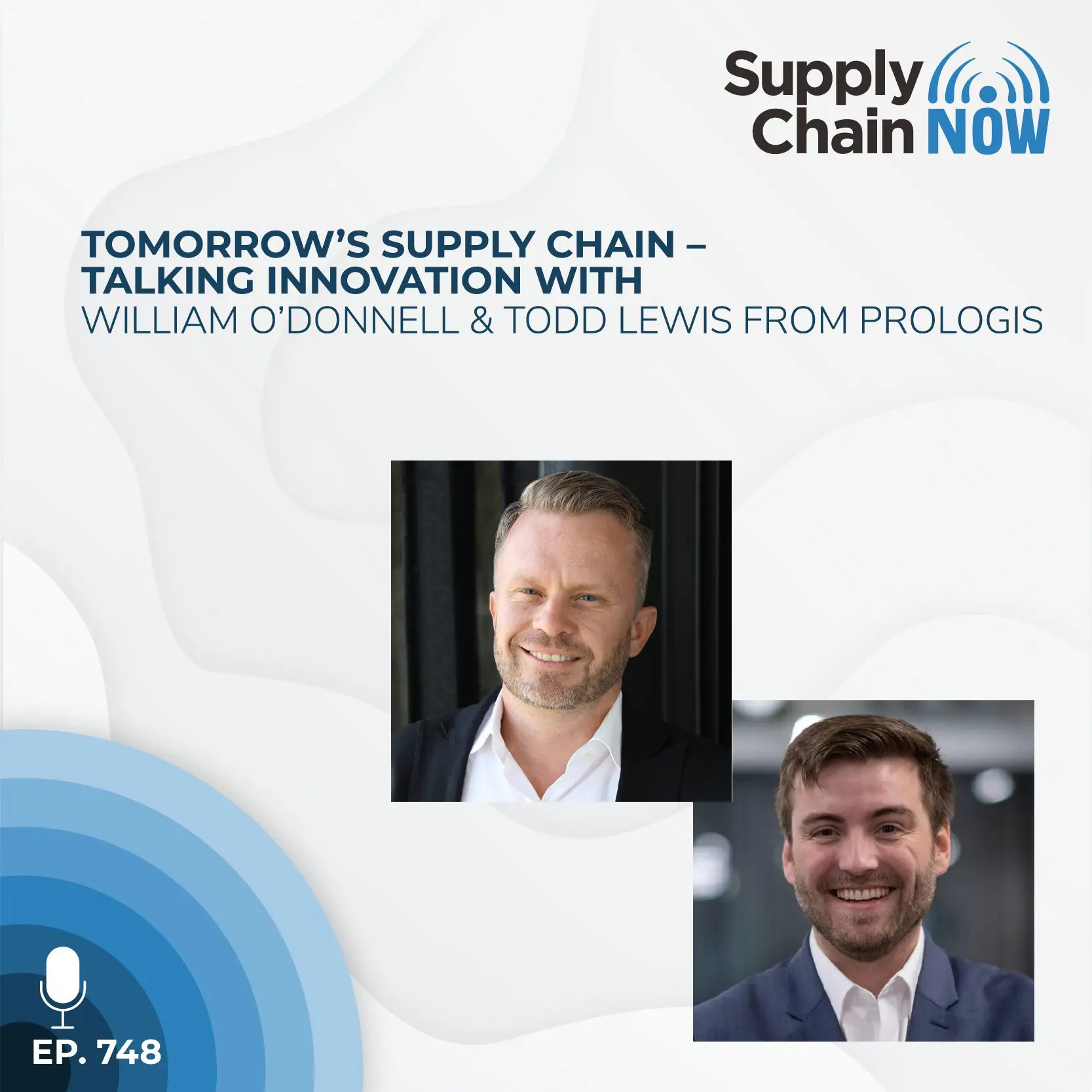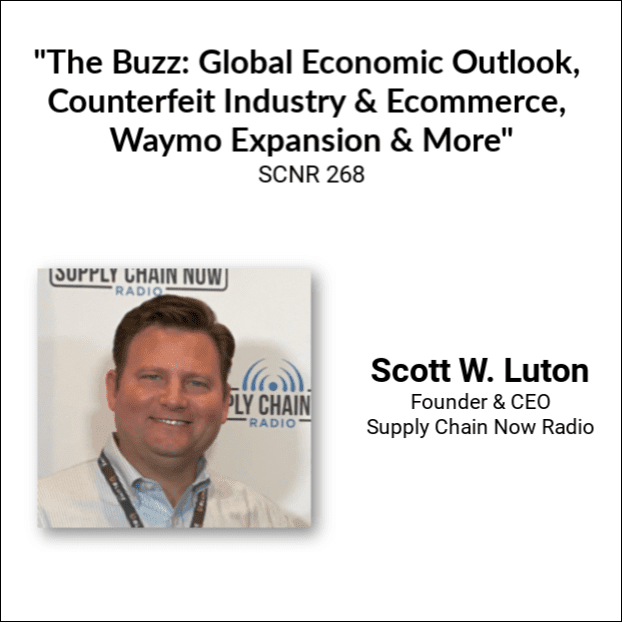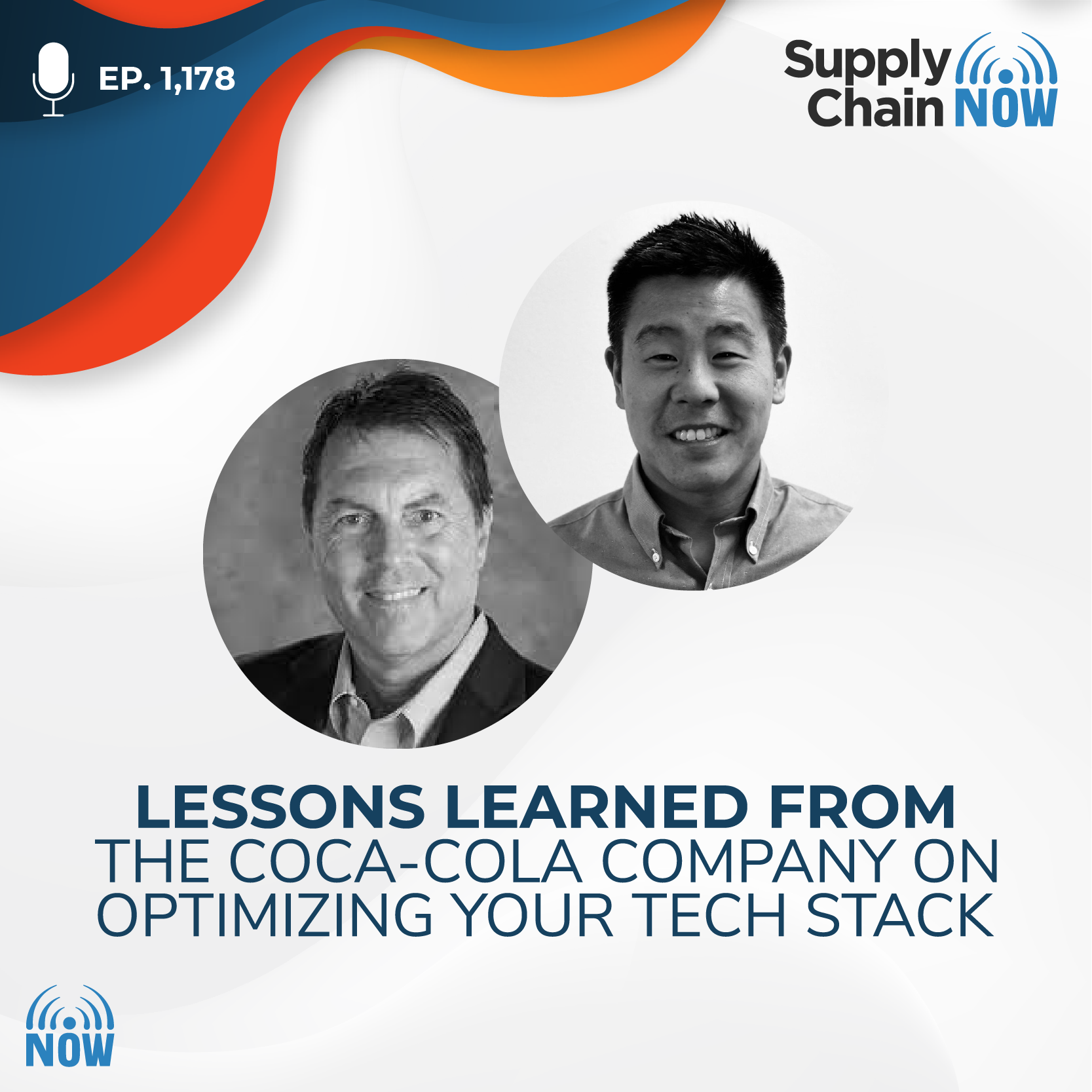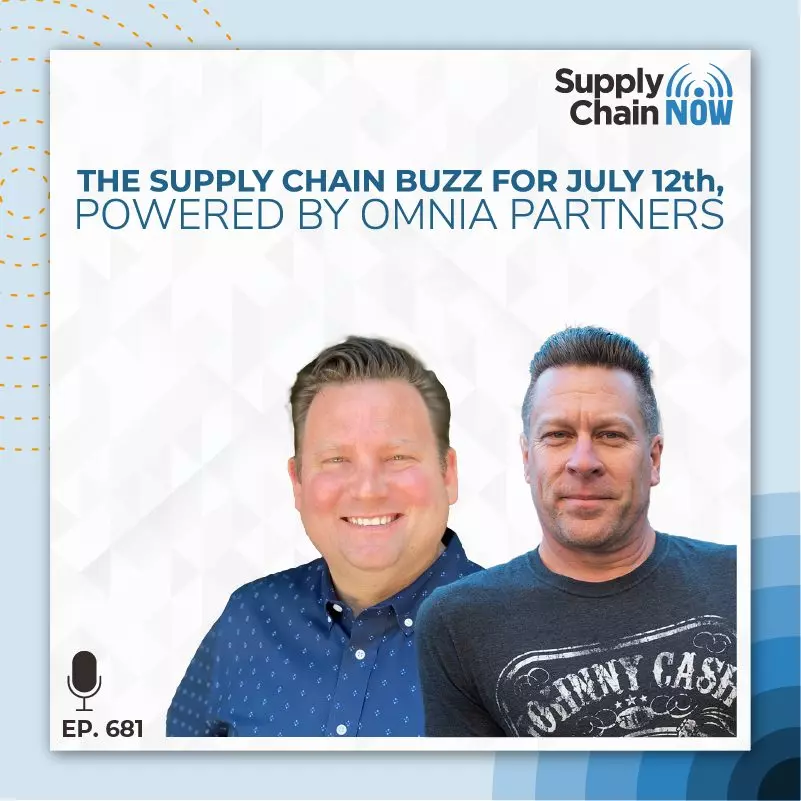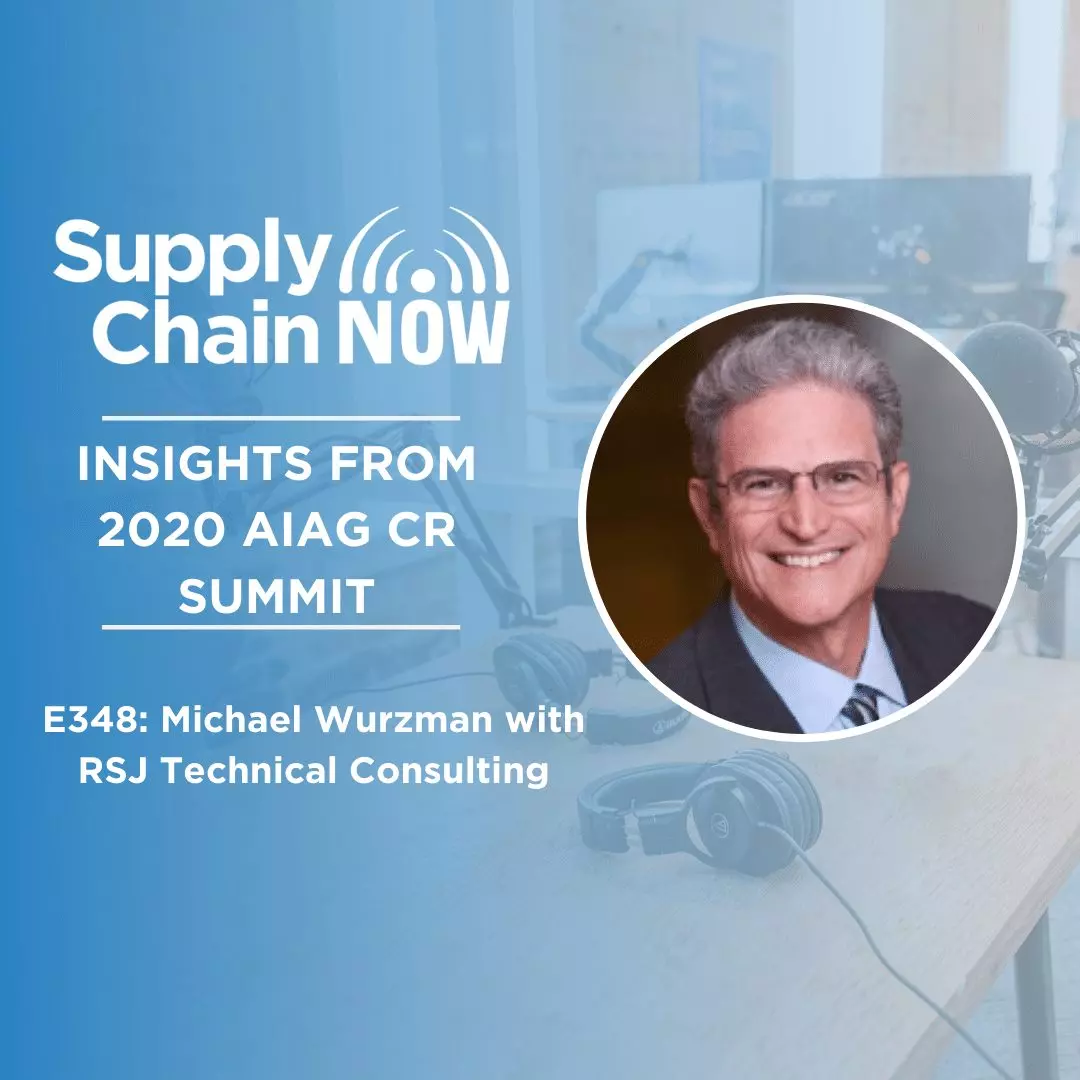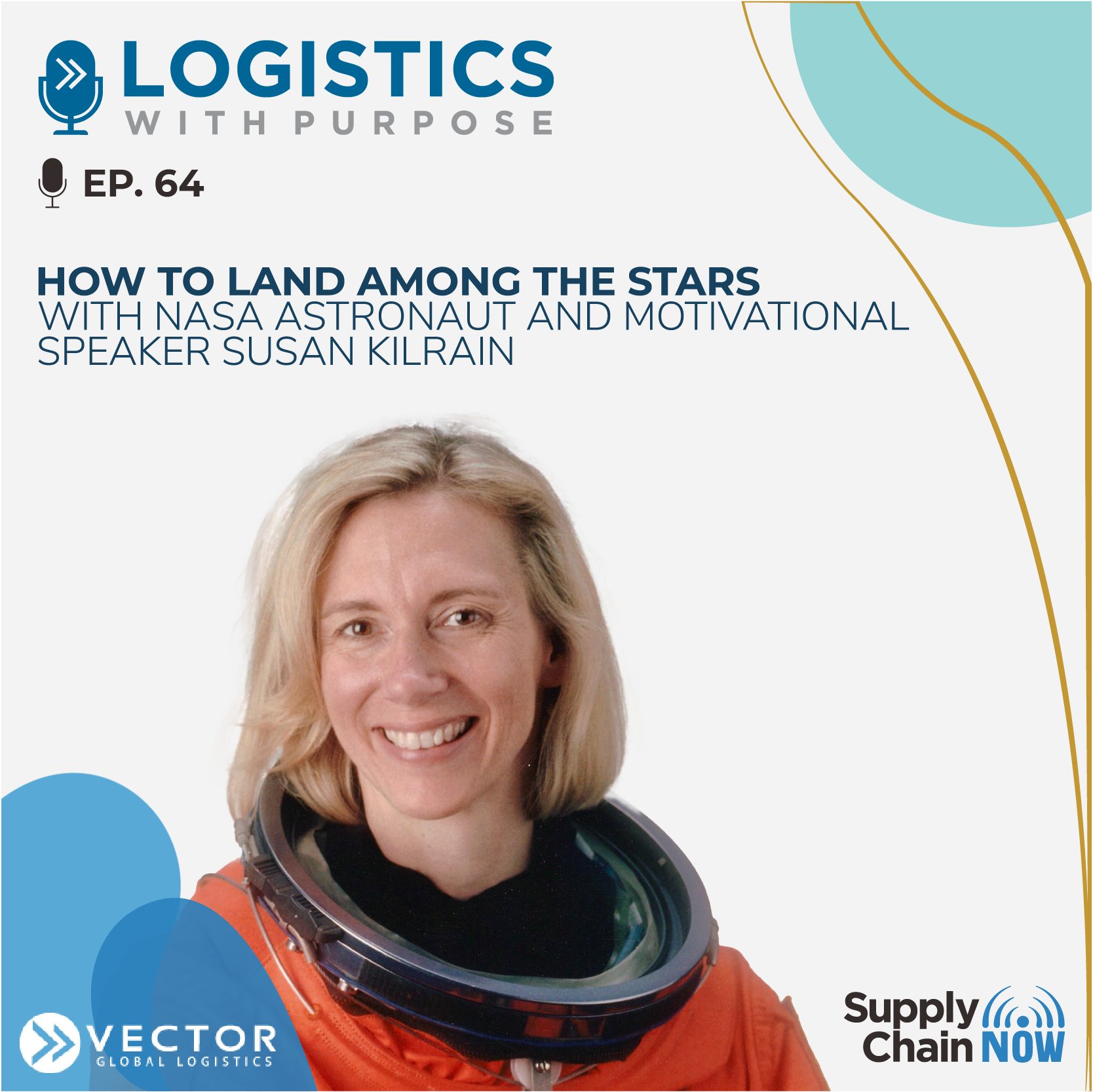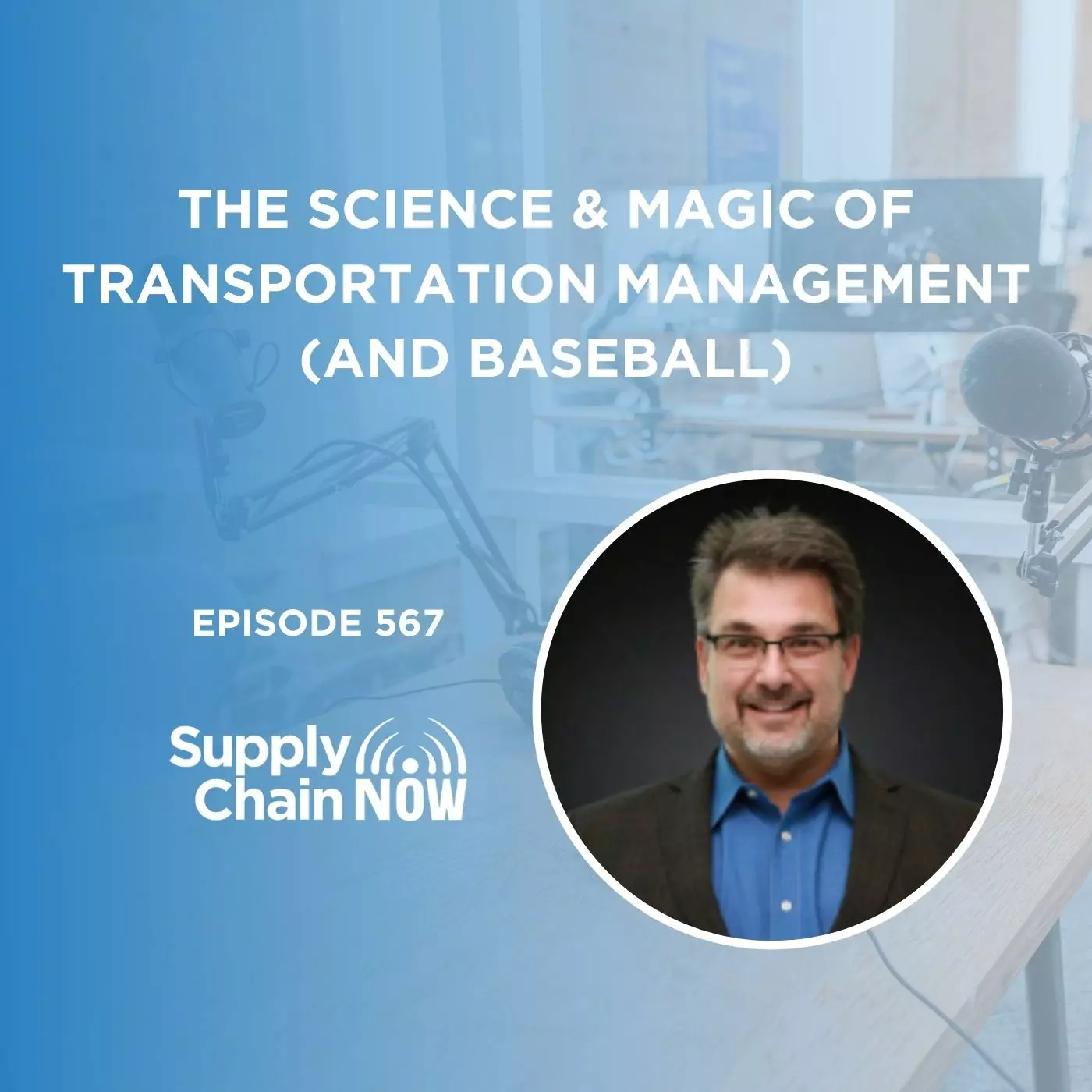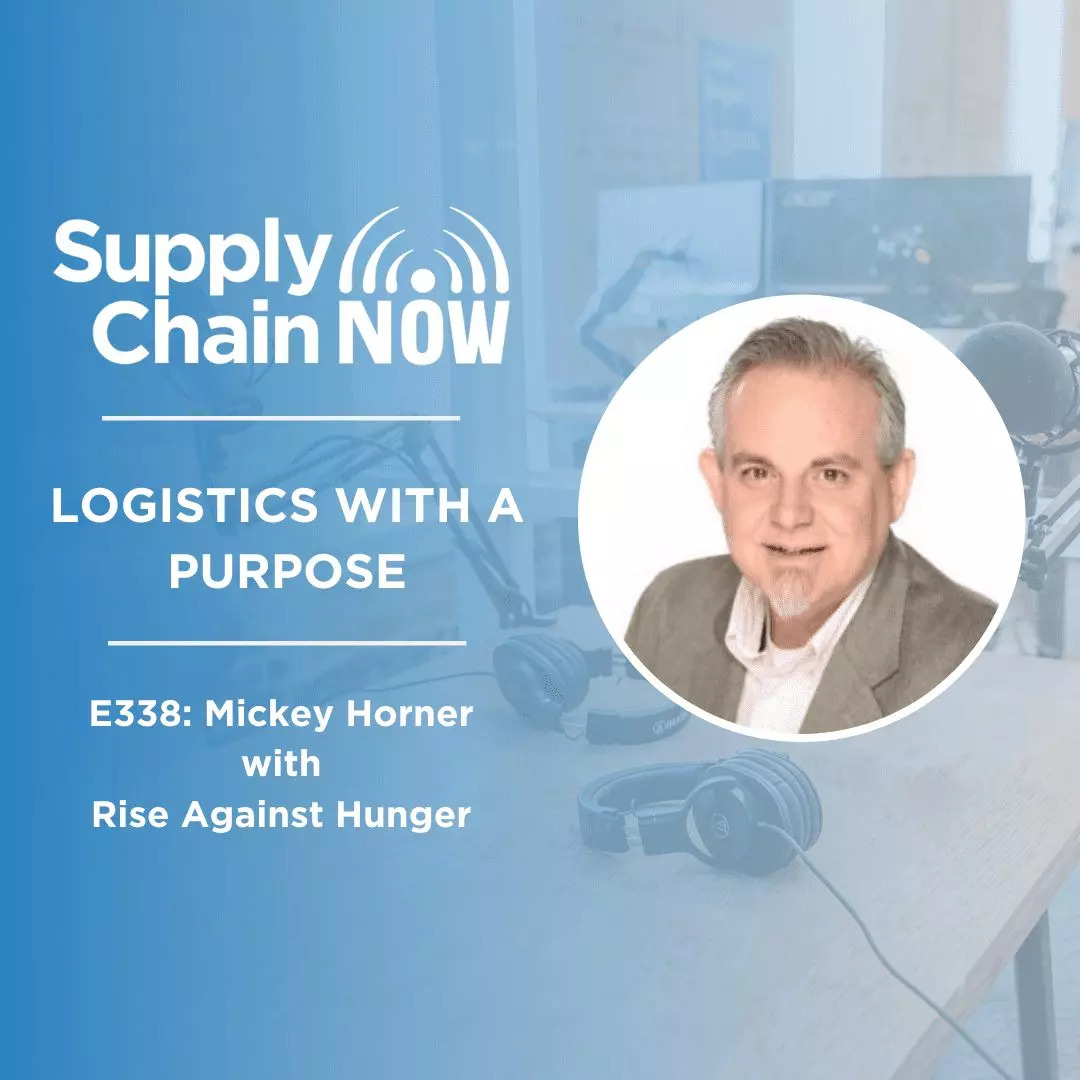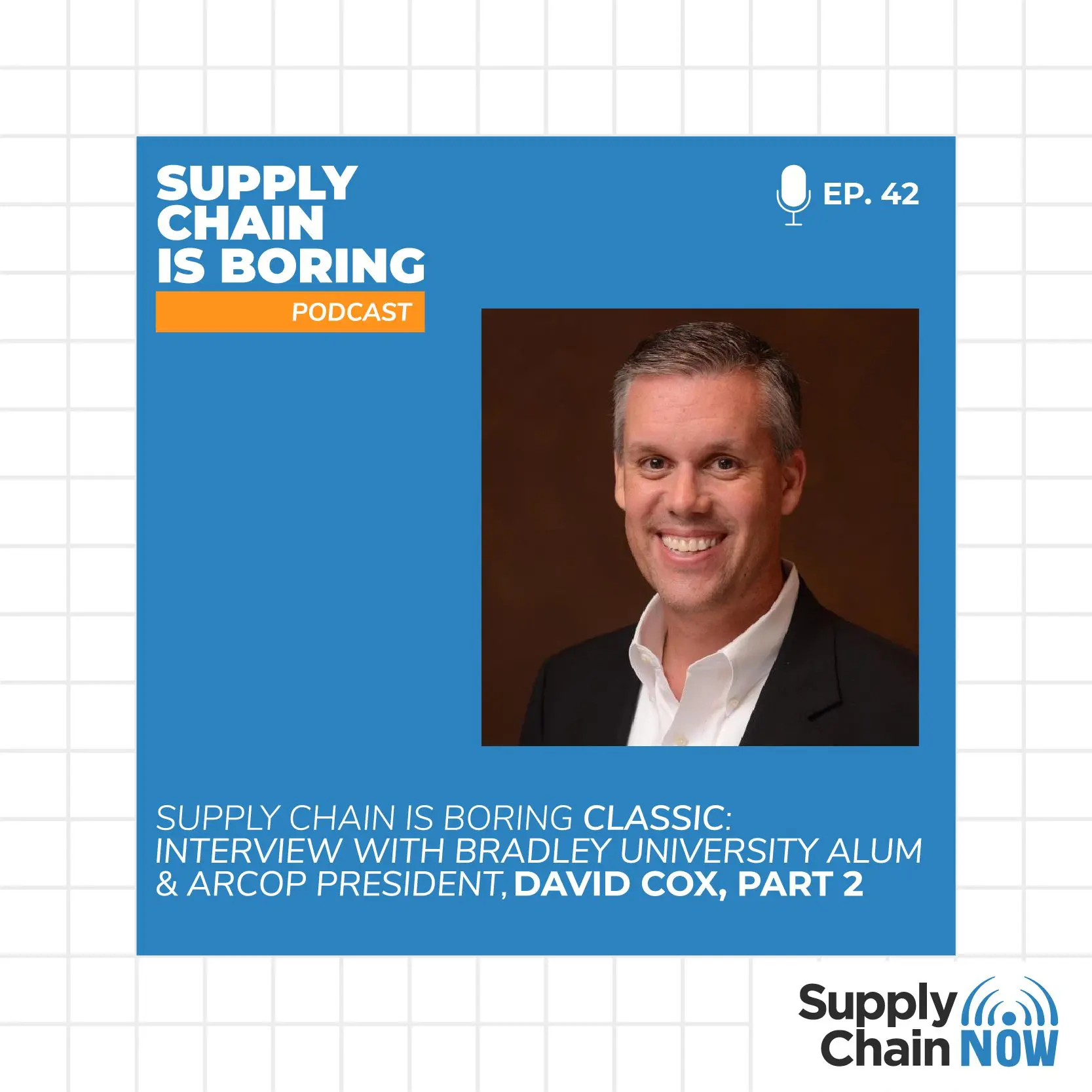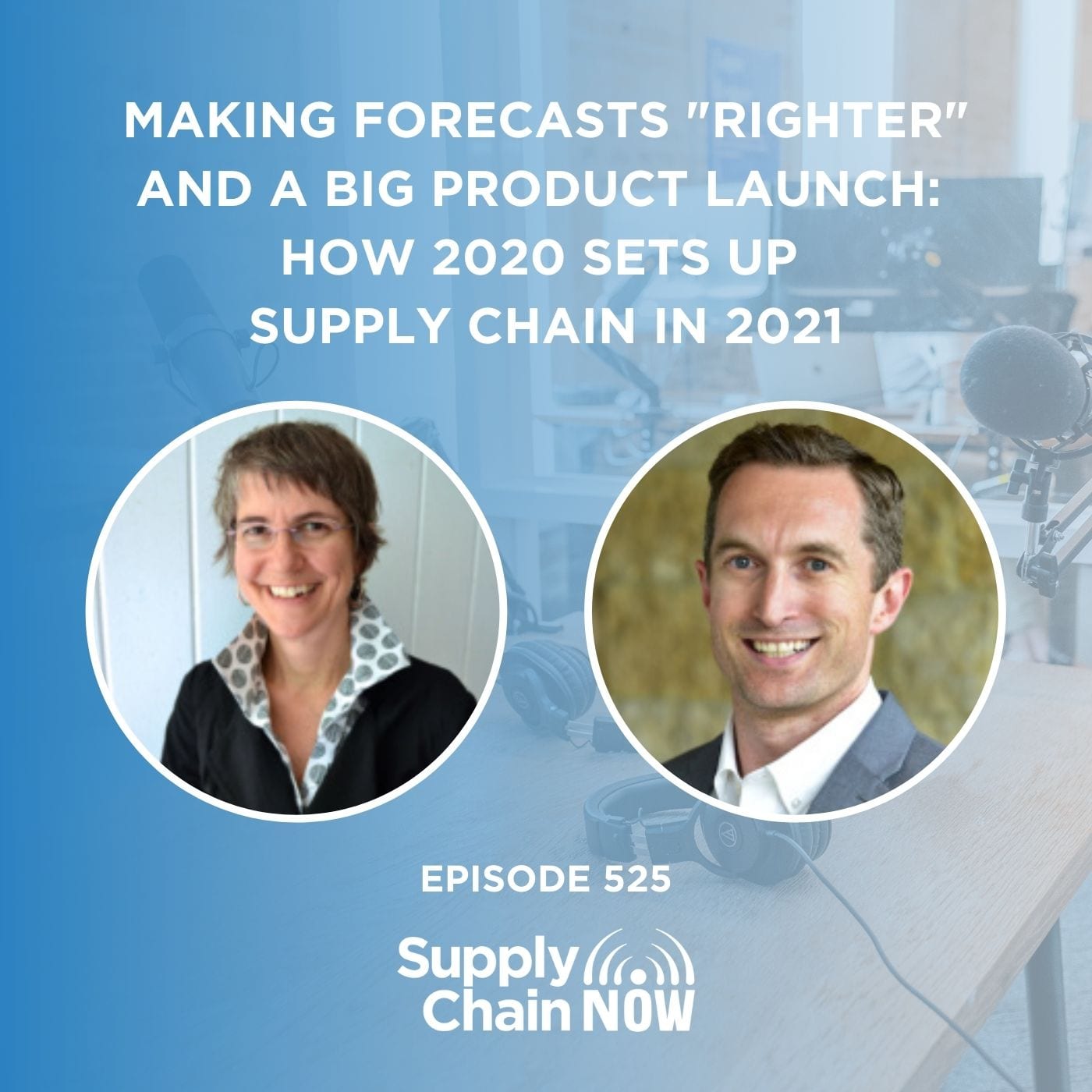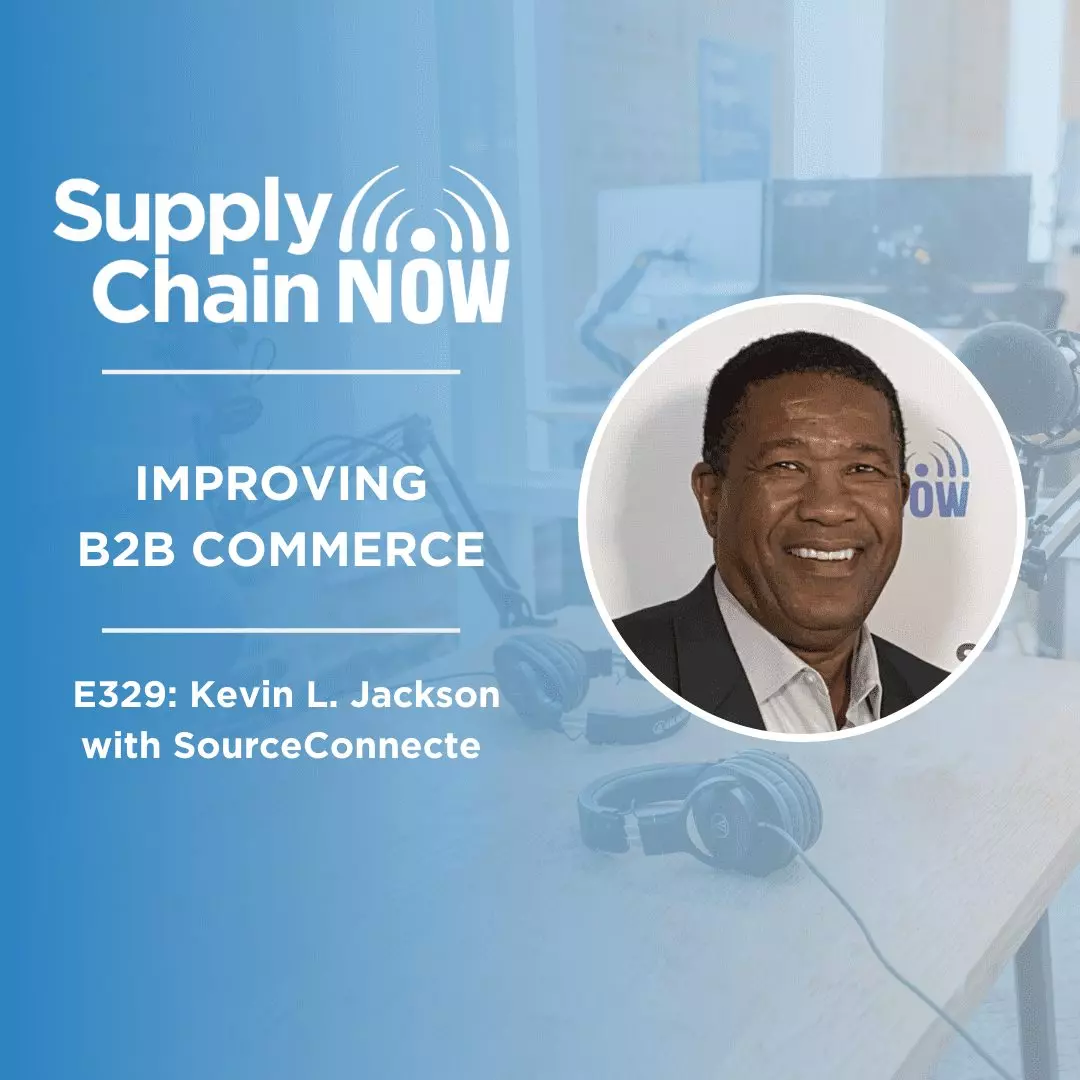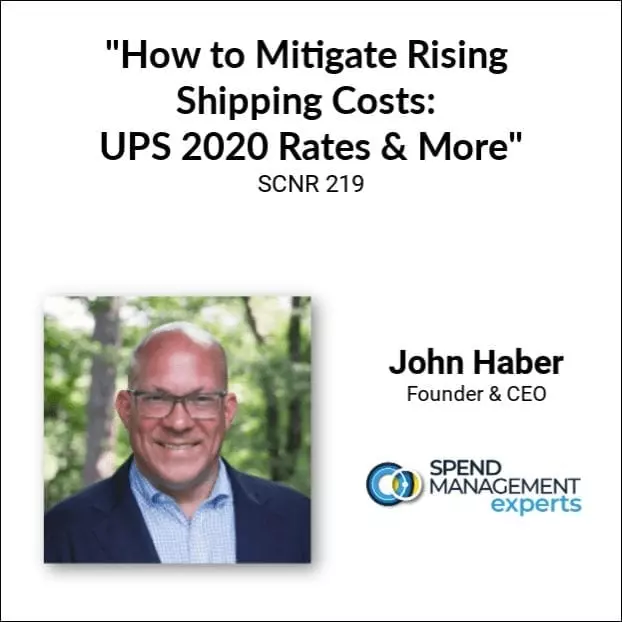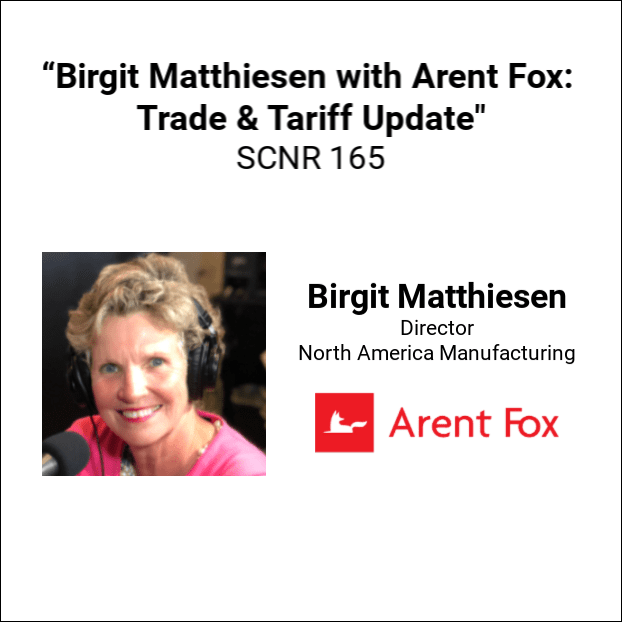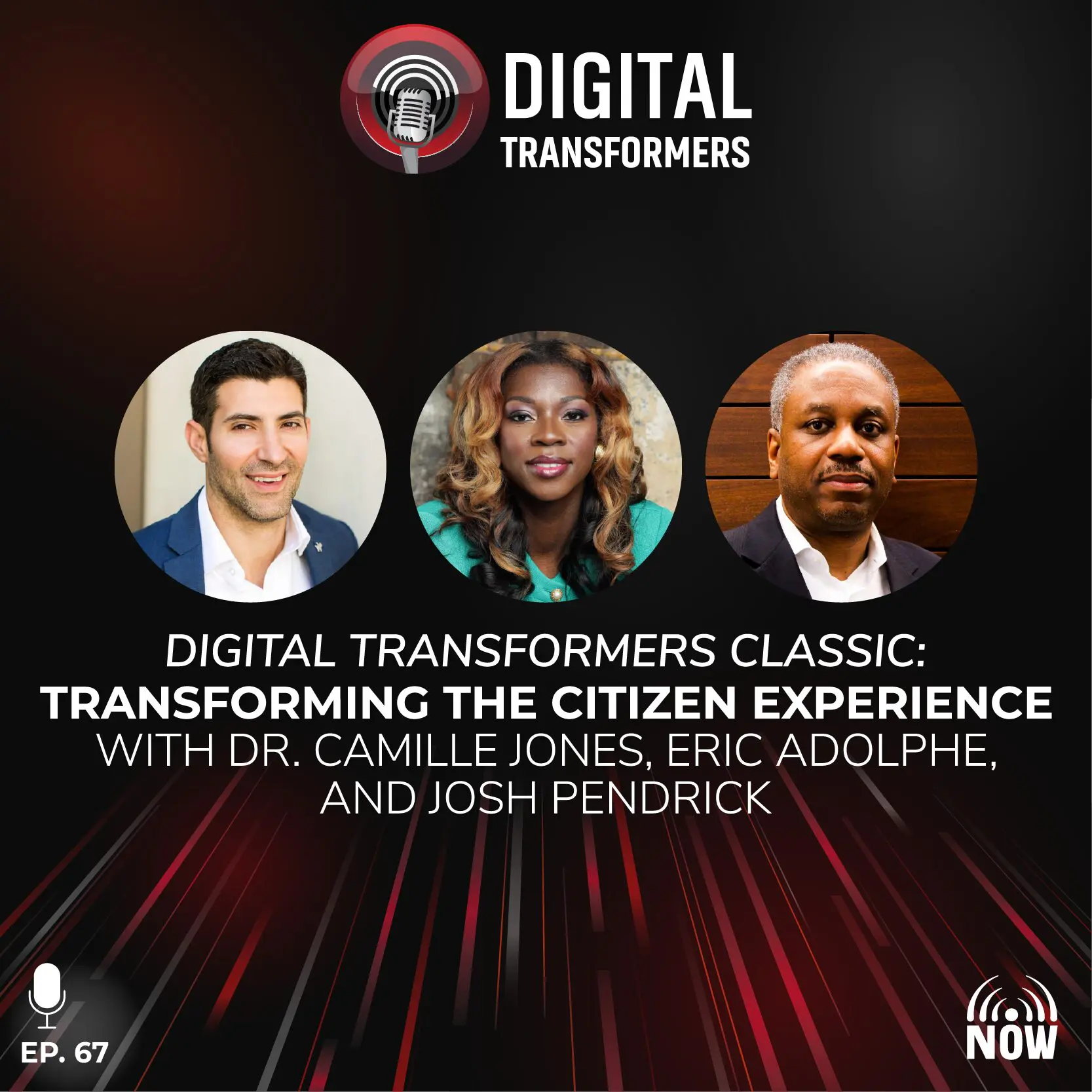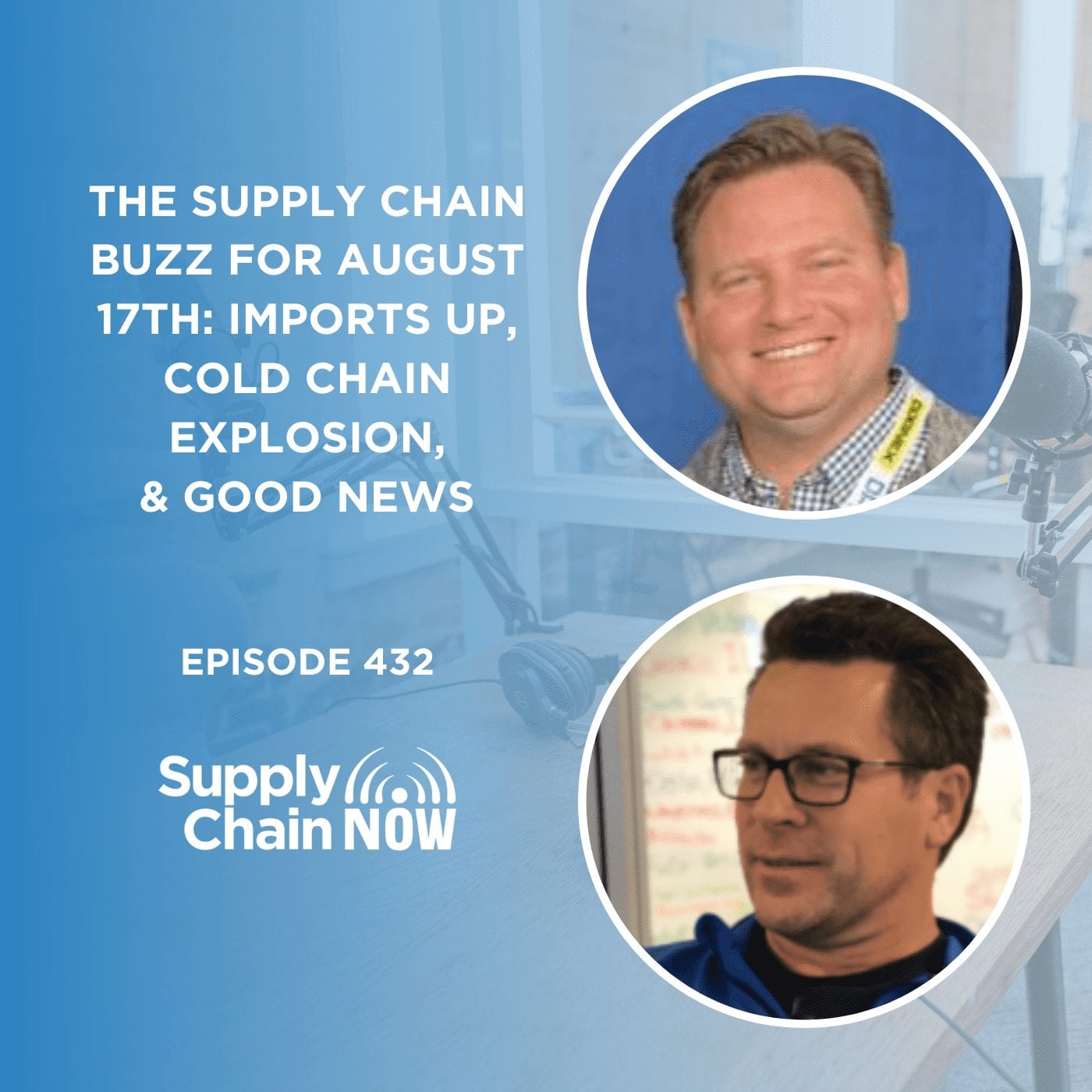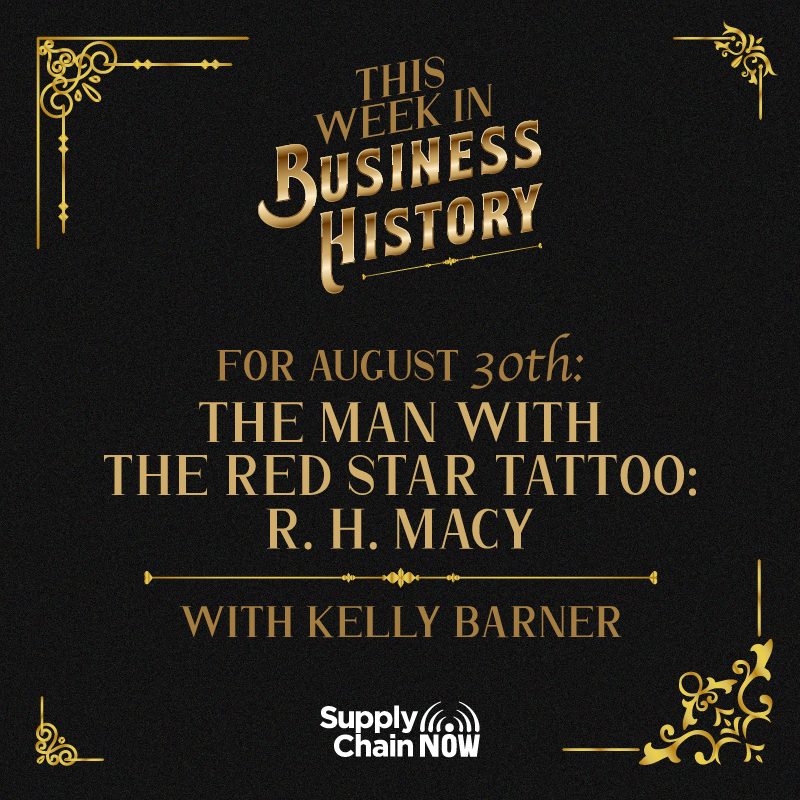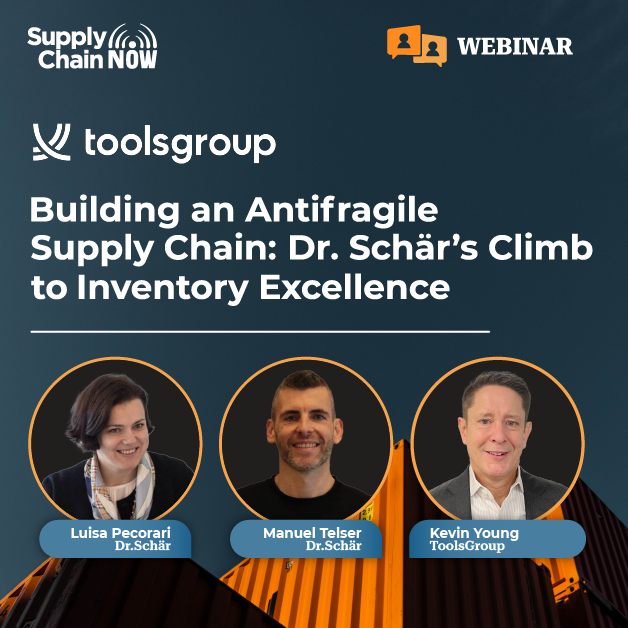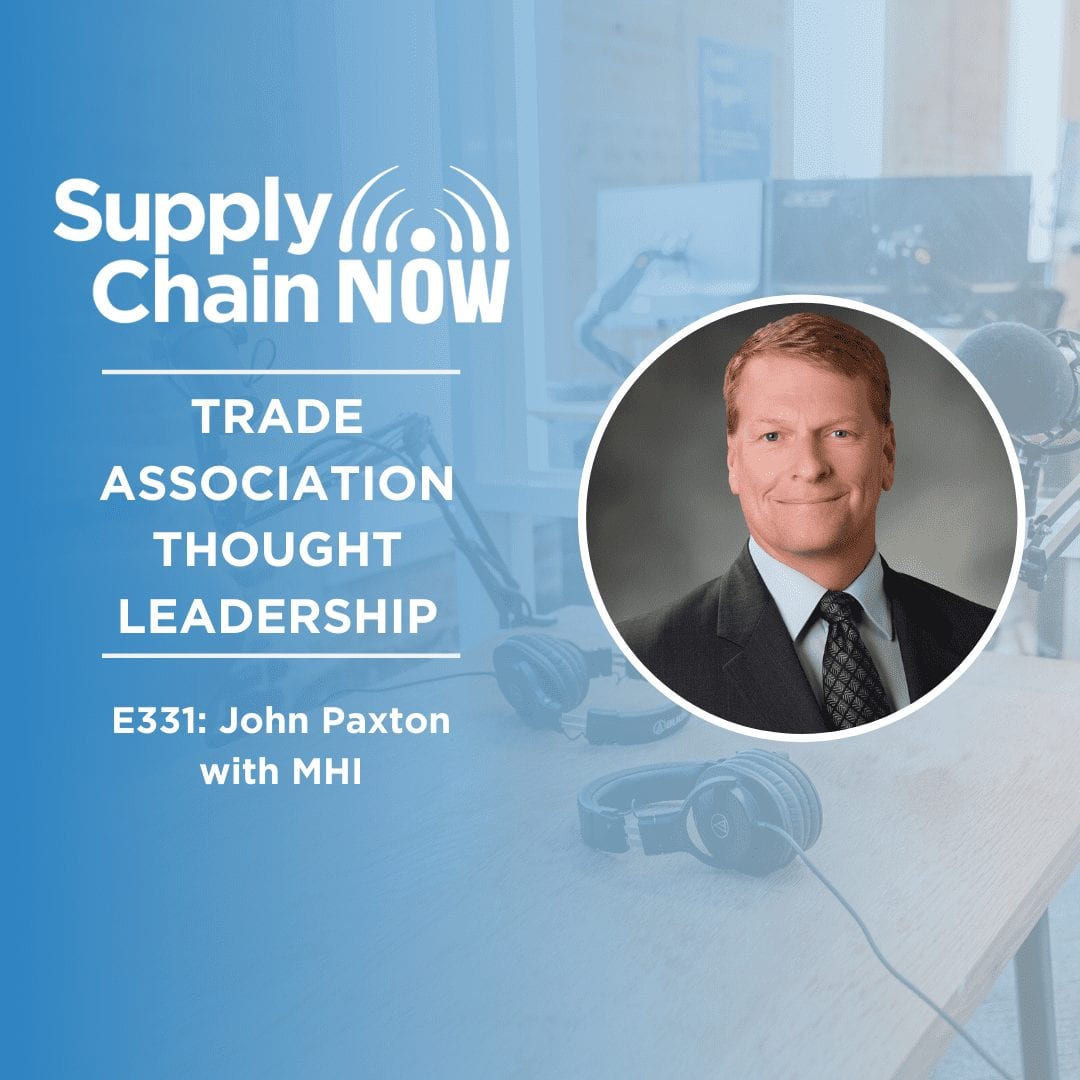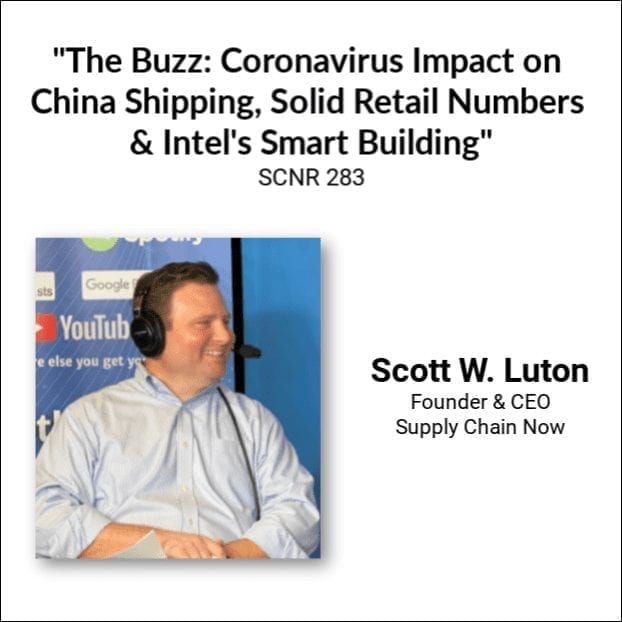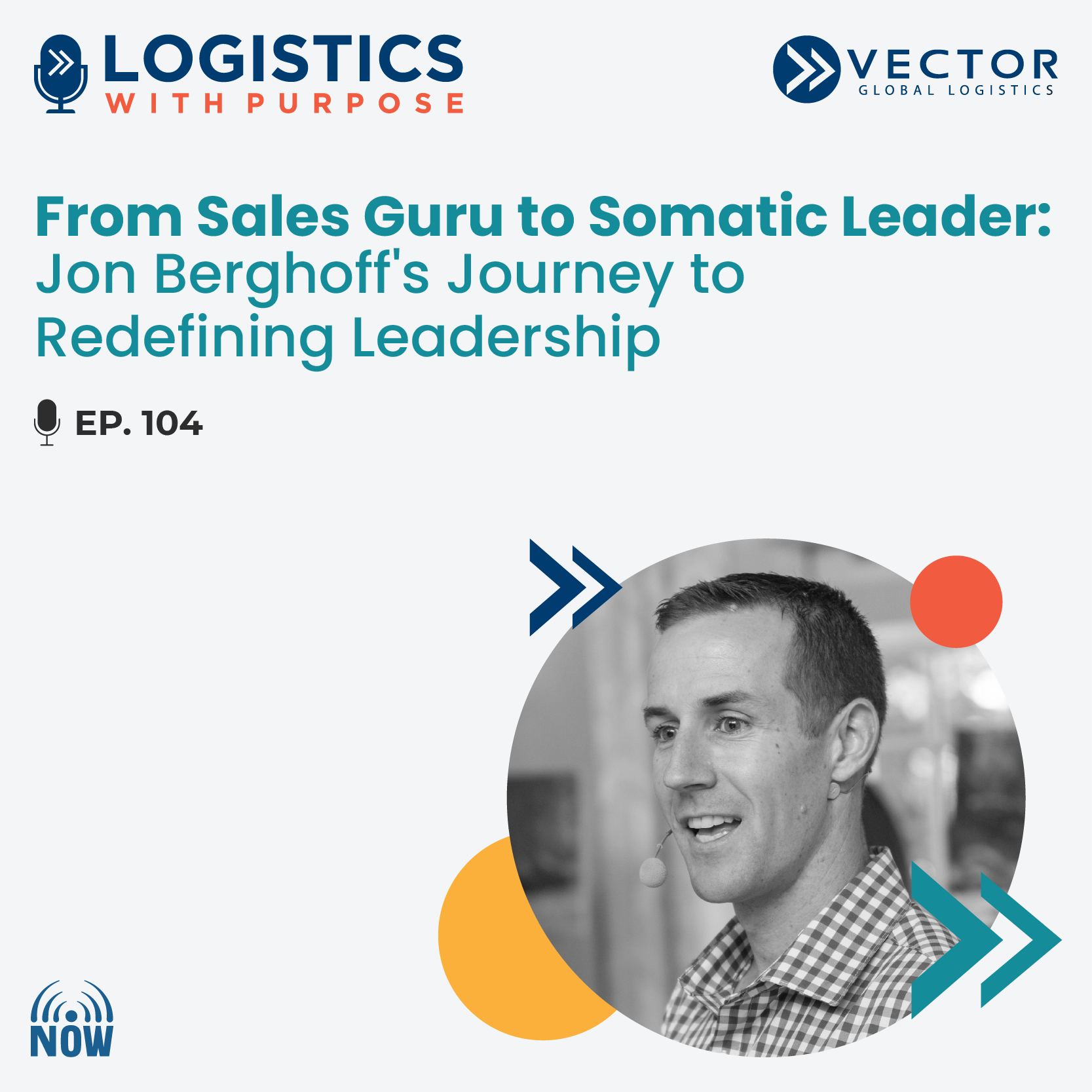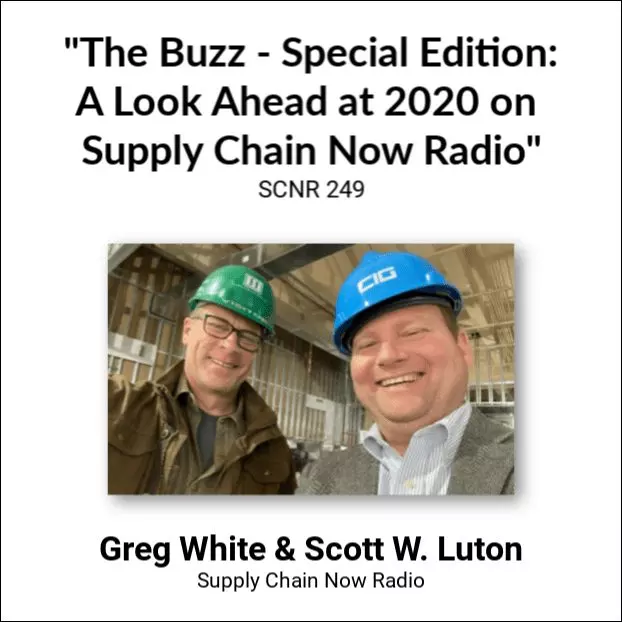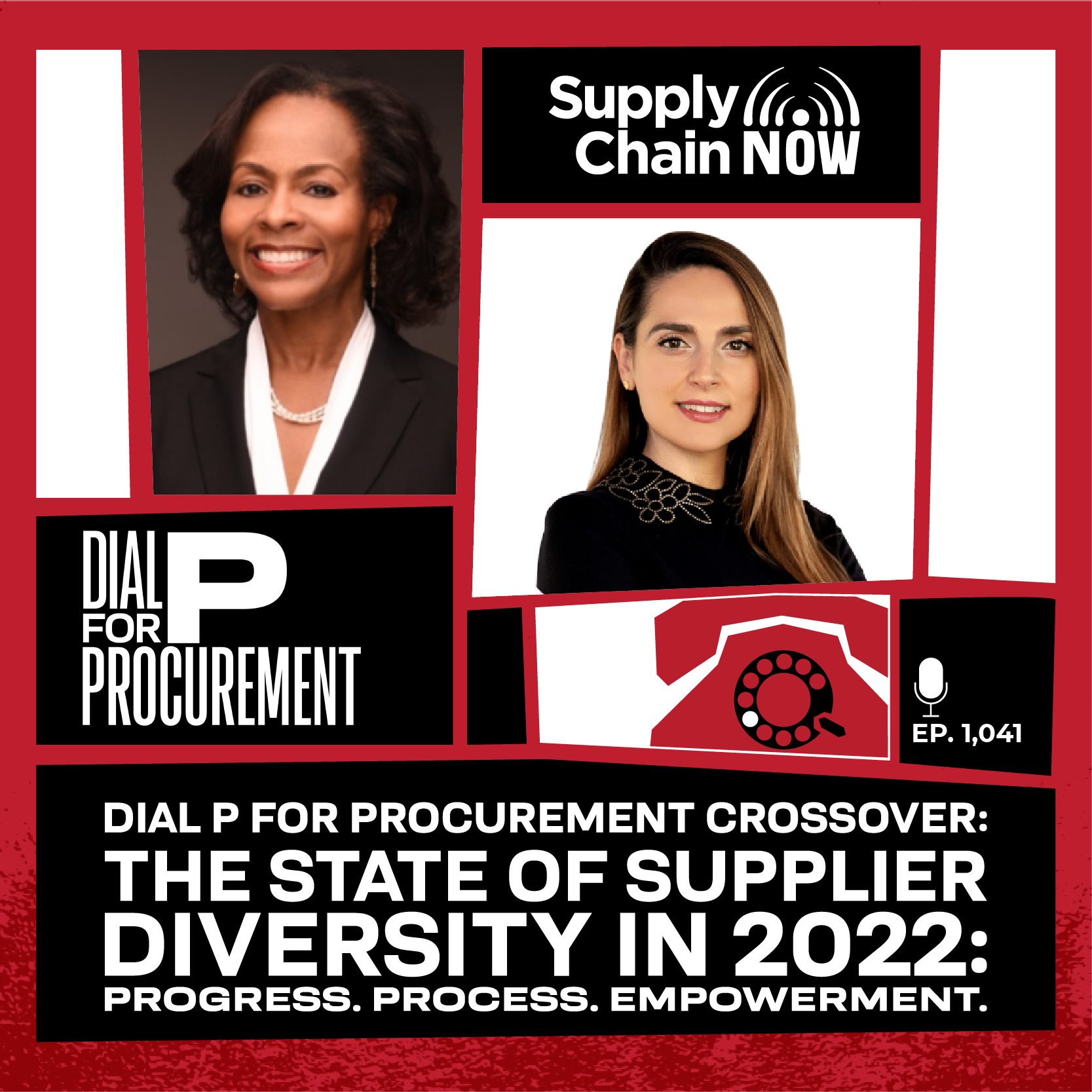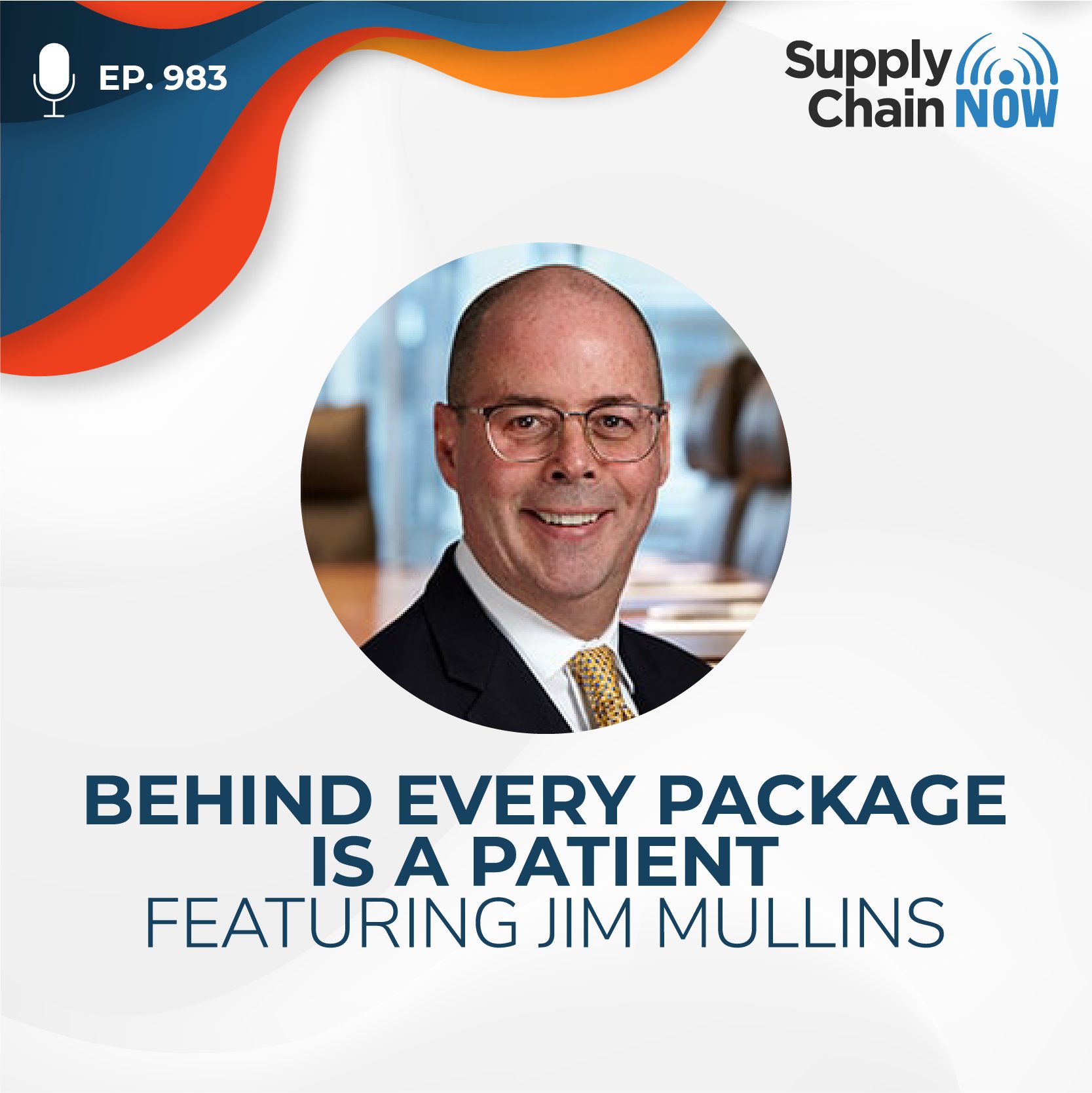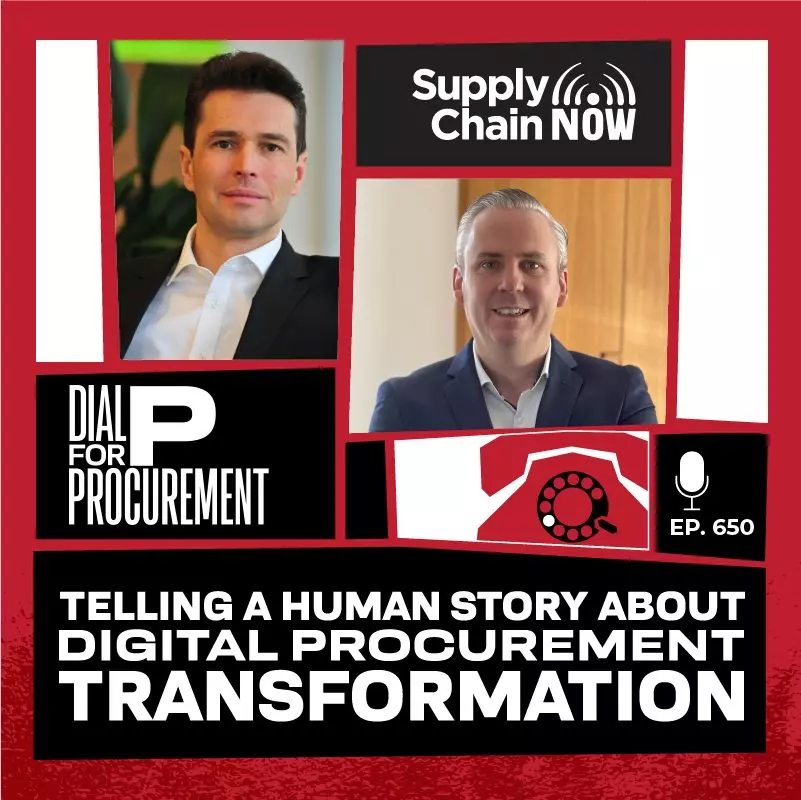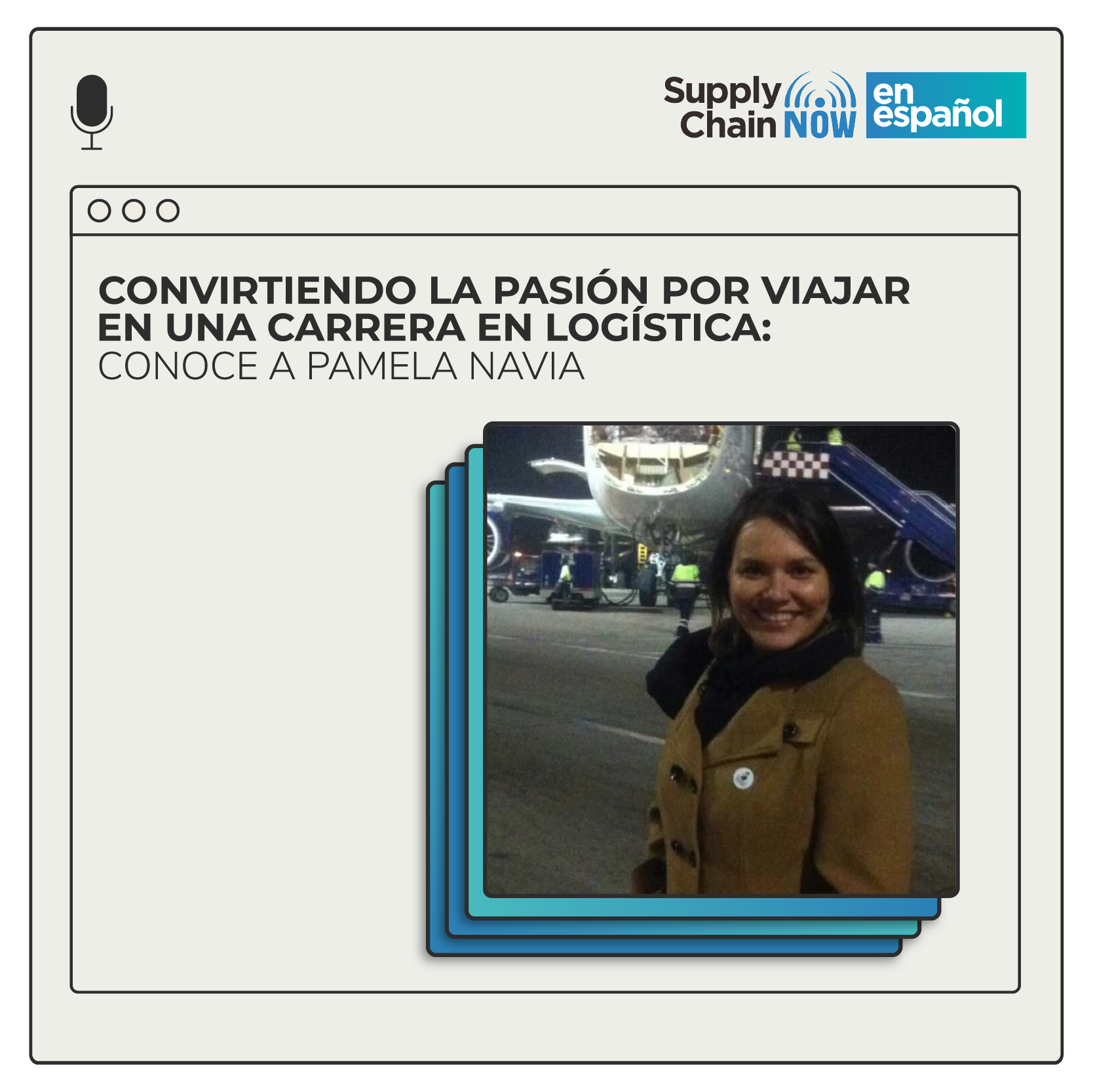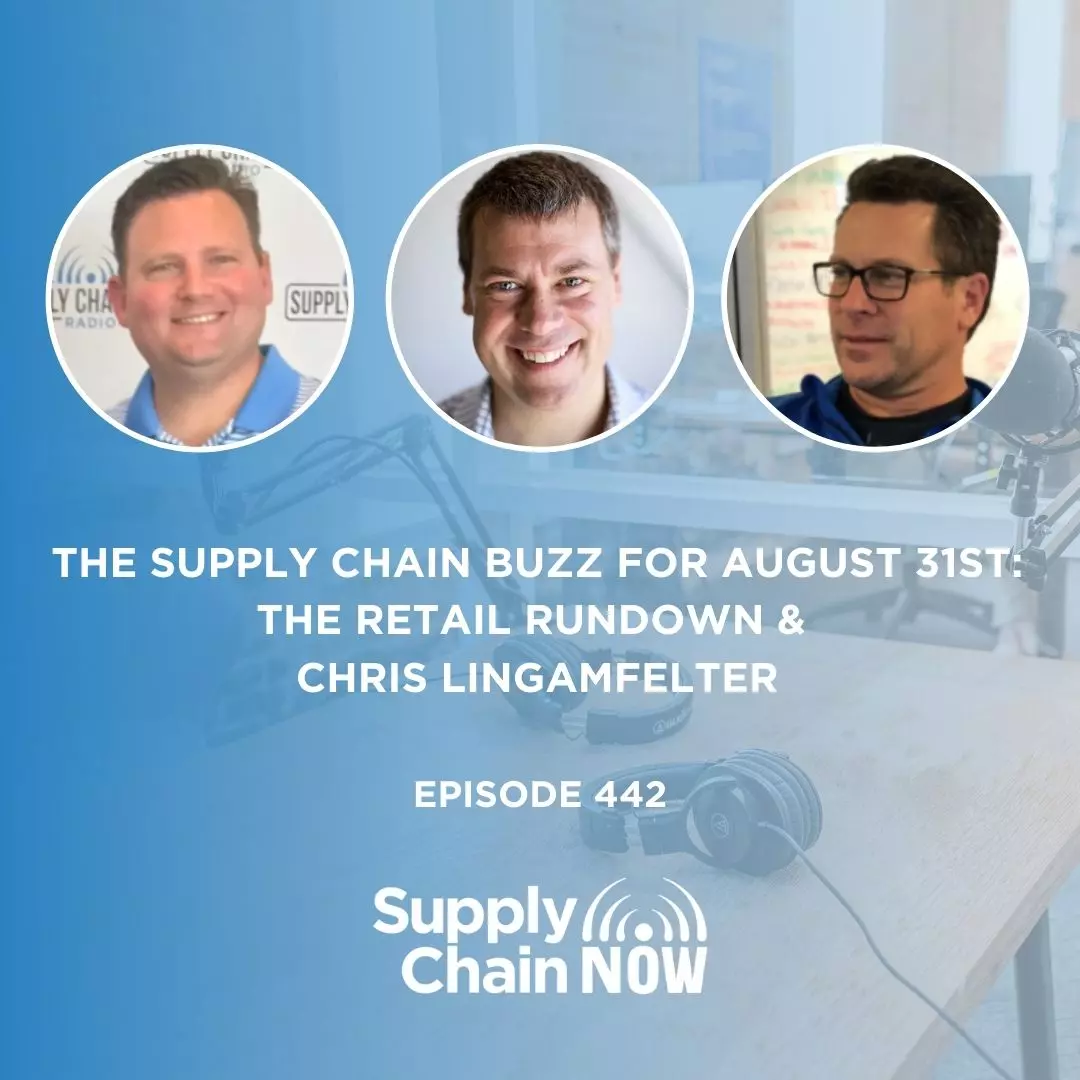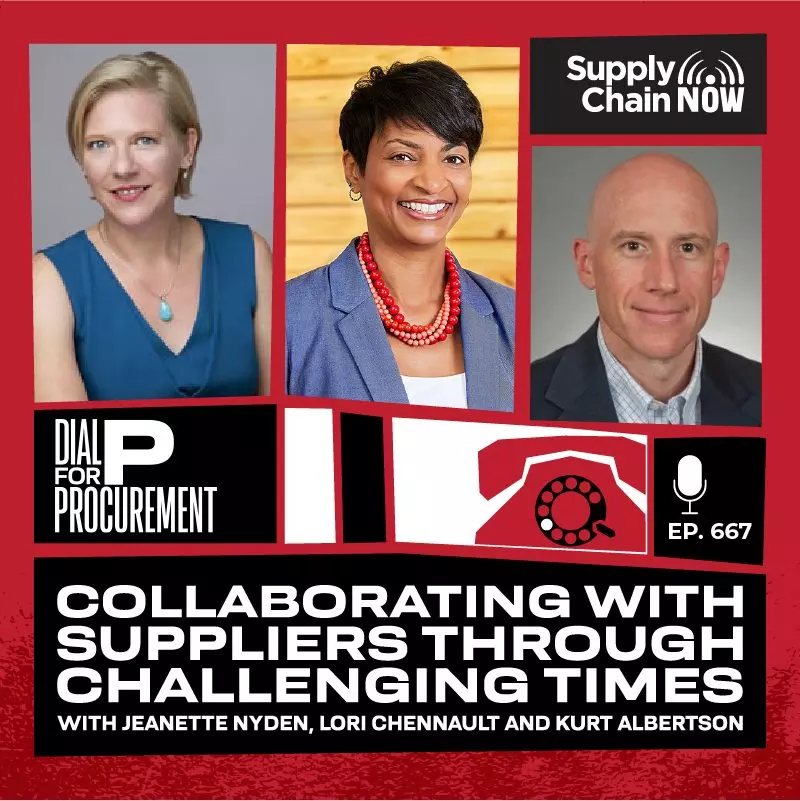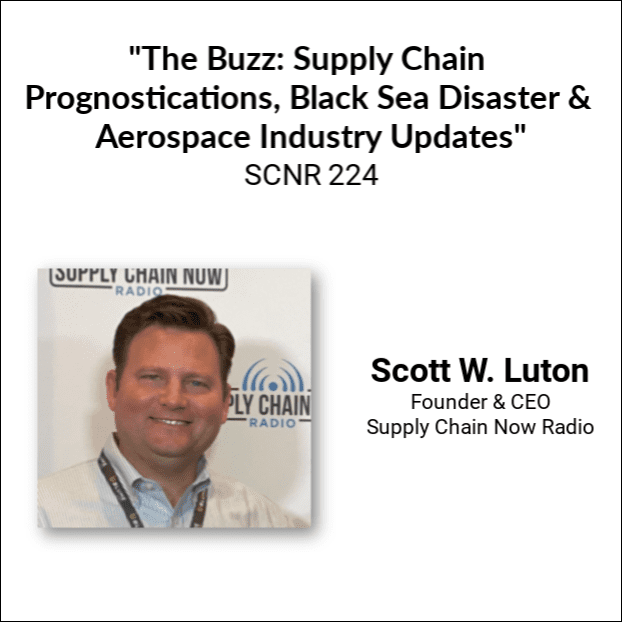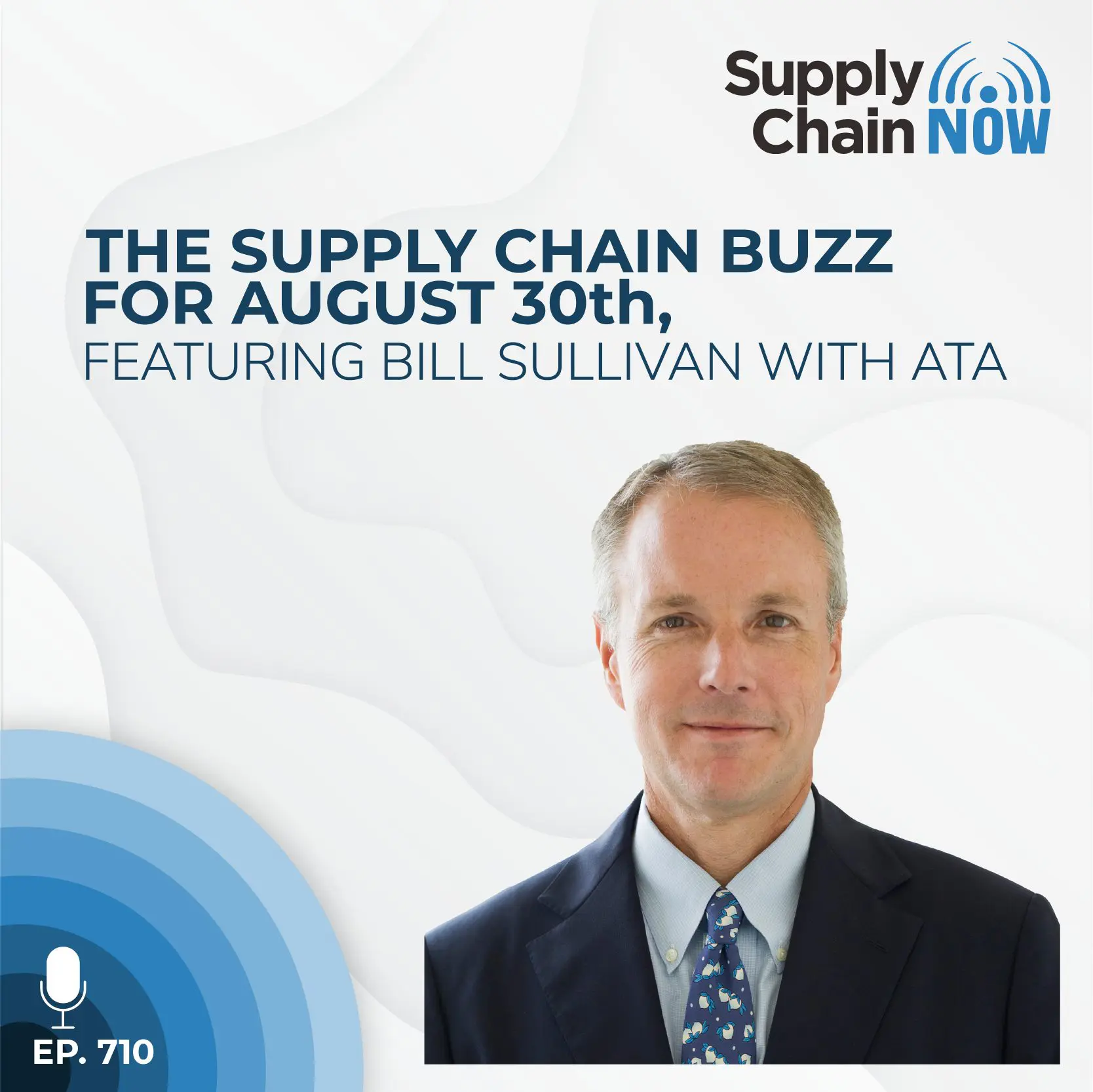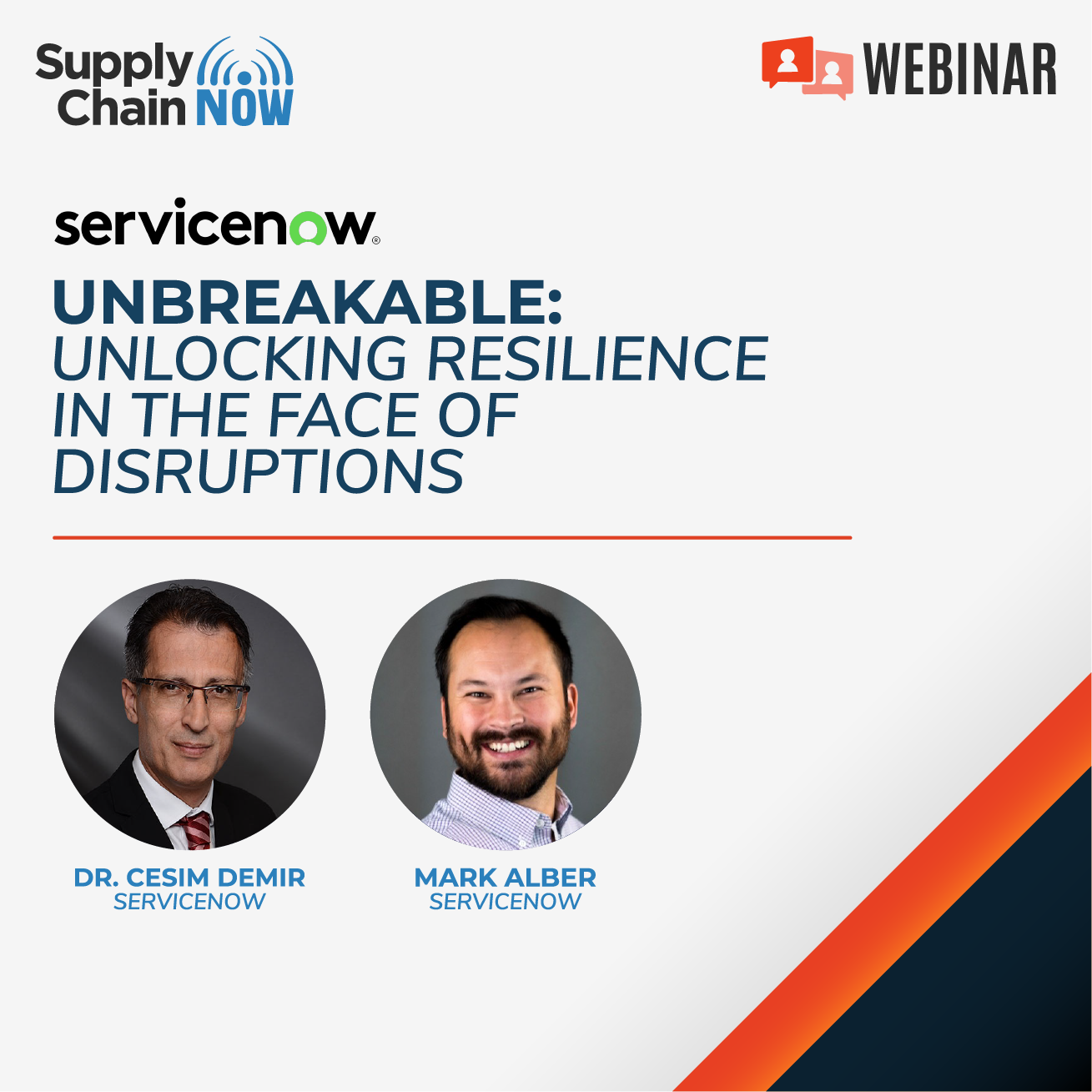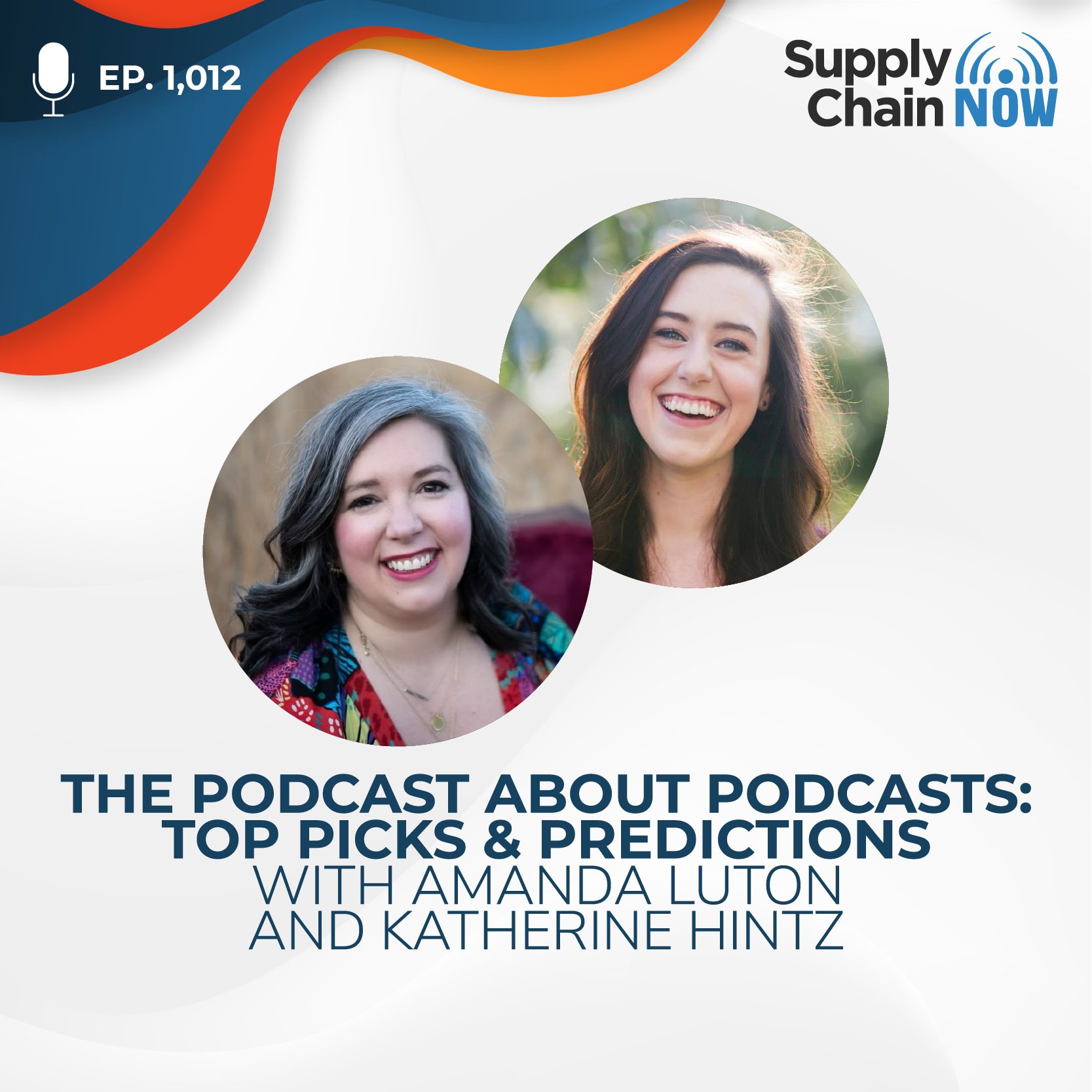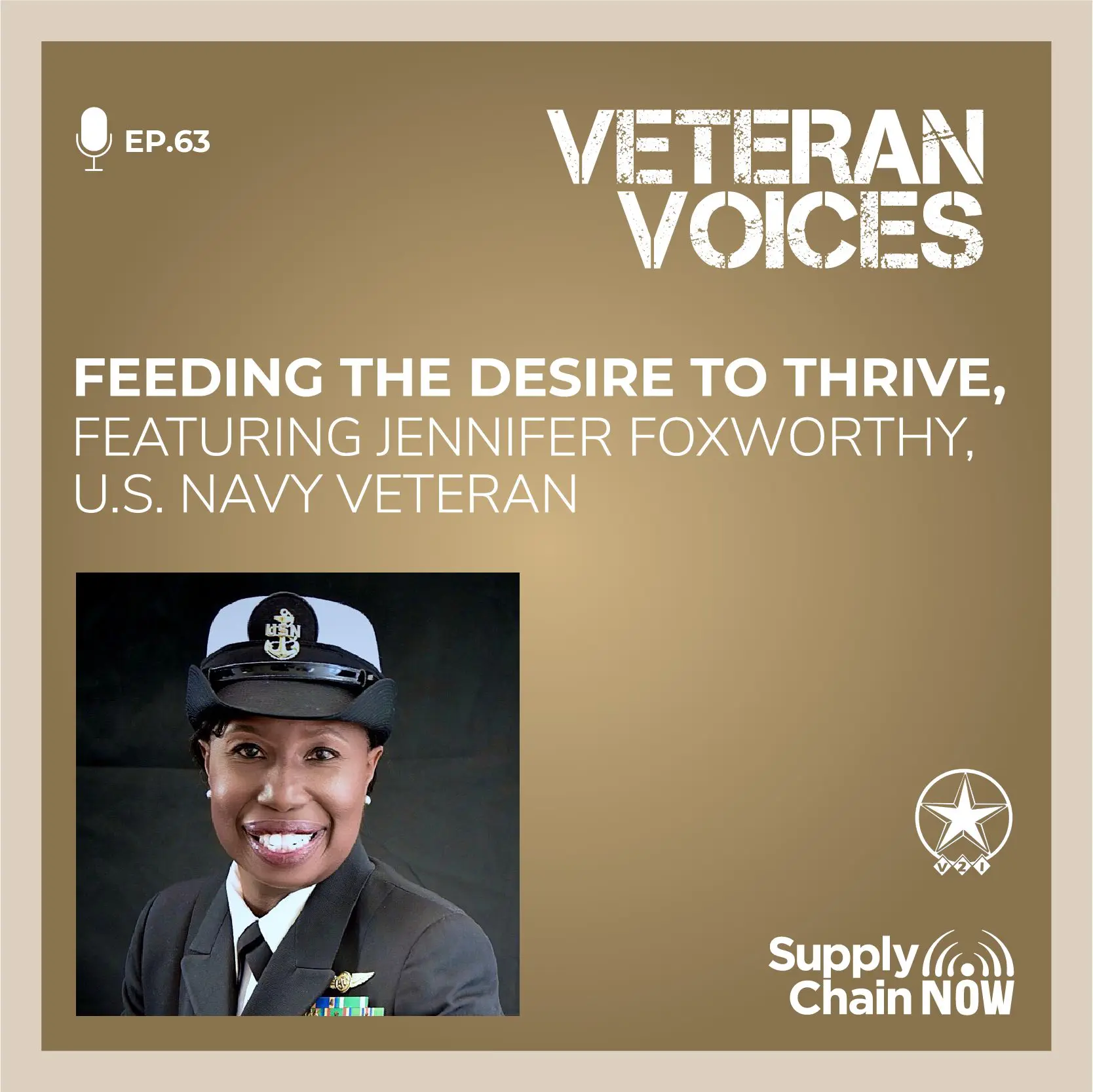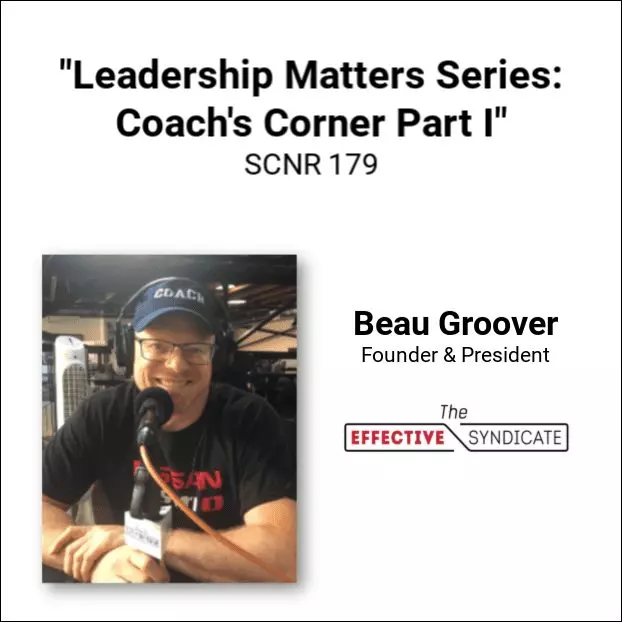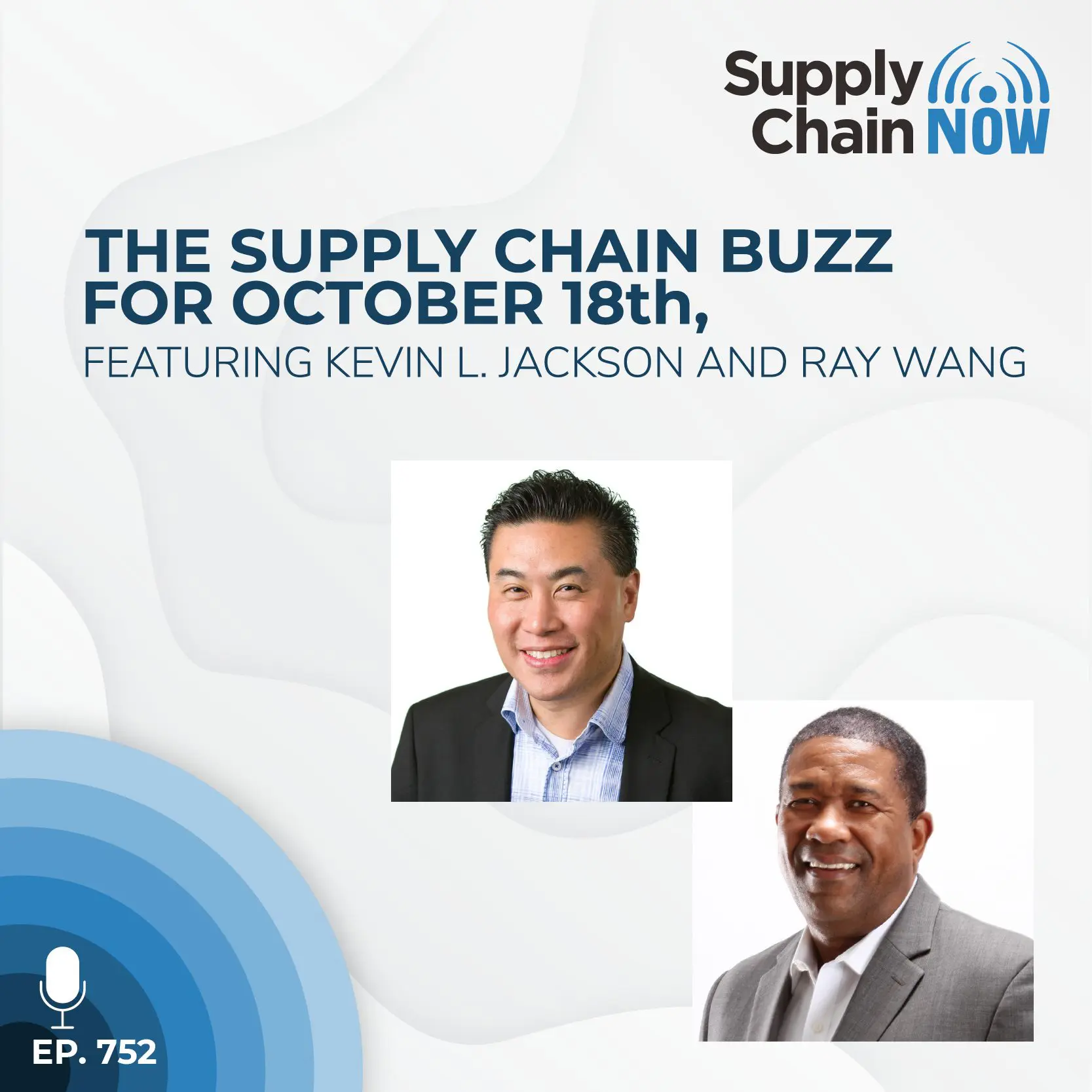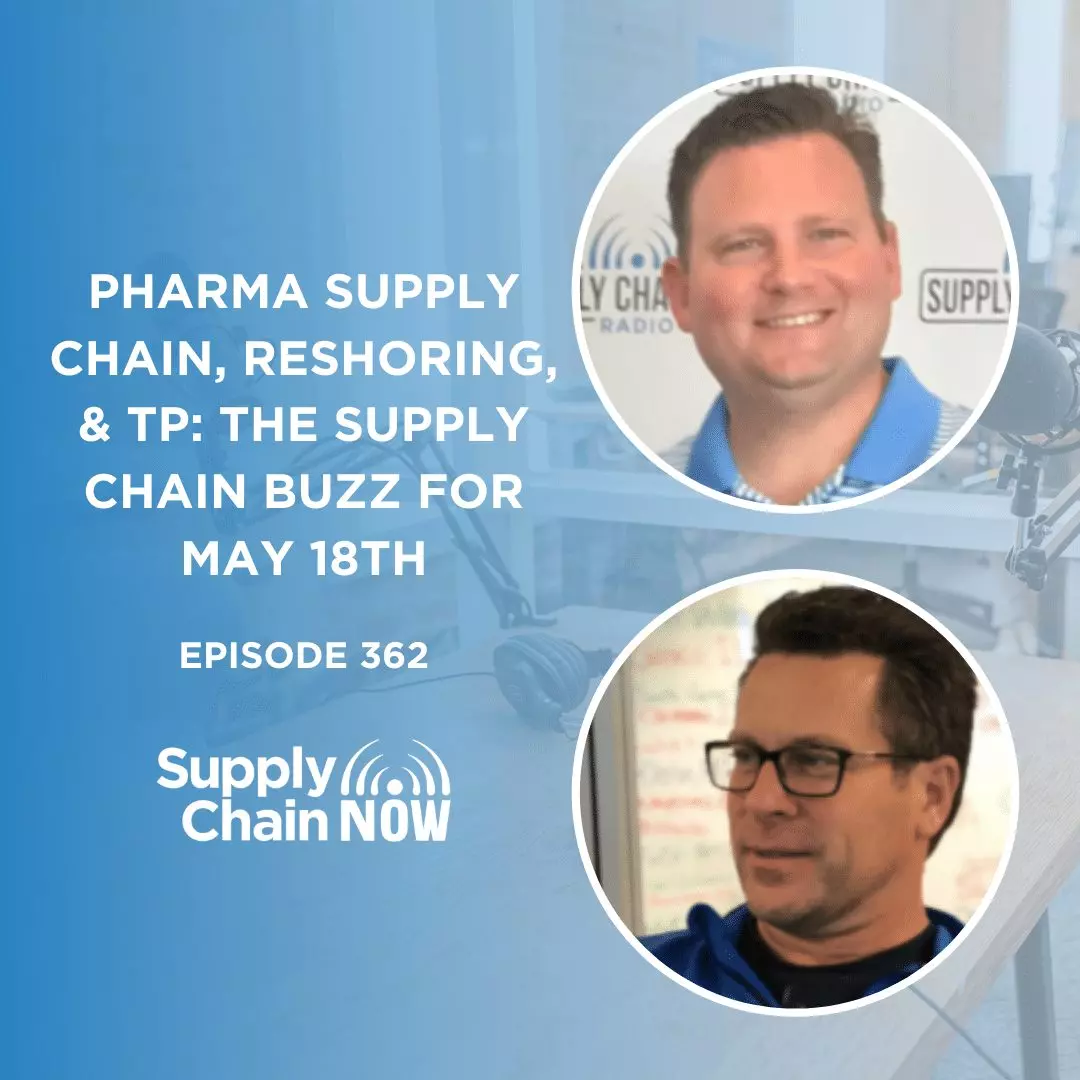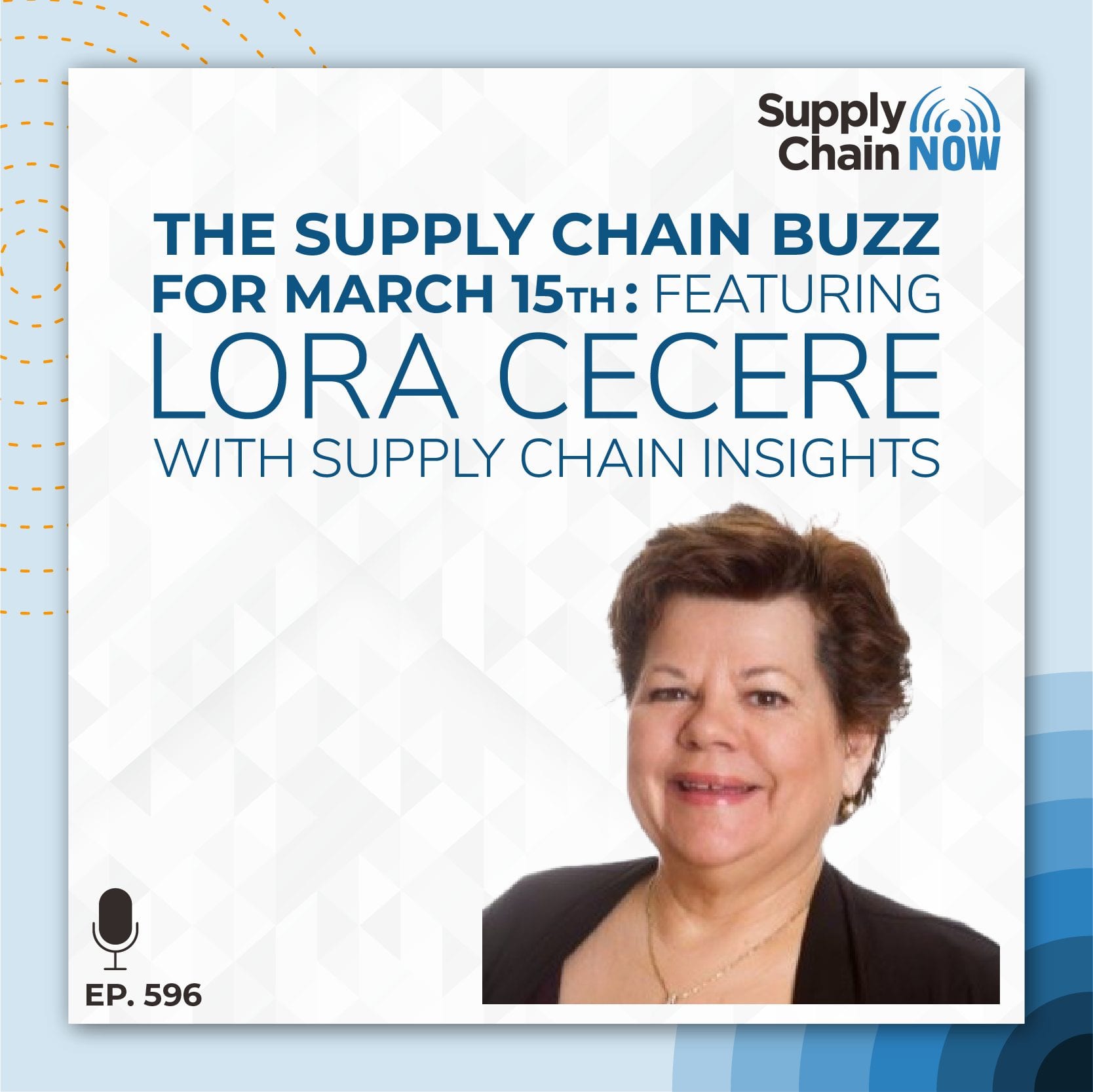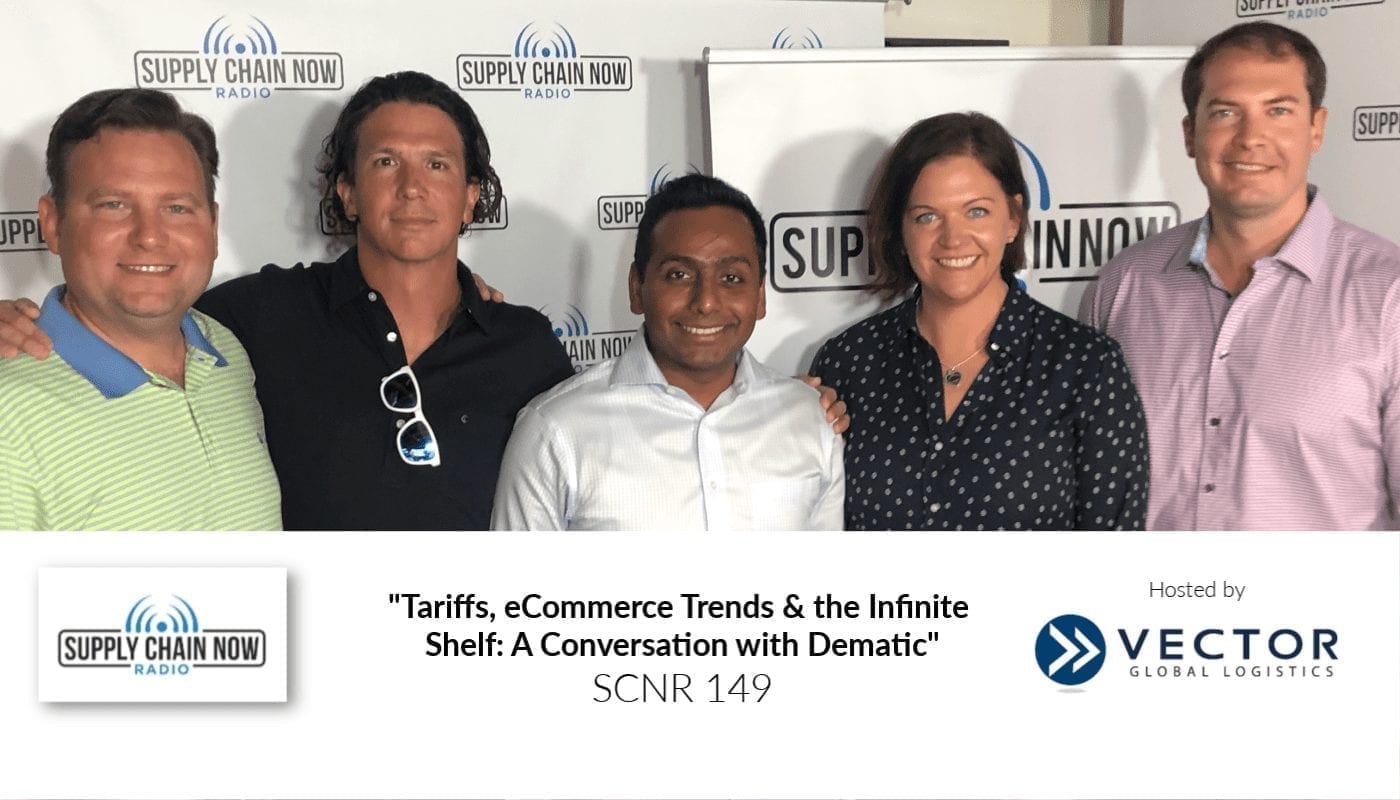
Episode Summary
The #SupplyChainCity team of Scott Luton, Ben Harris, and Will Haraway welcome Shibu Sasidharan and Kristen Delphos of Dematic for a conversation about tariffs, eCommerce trends, and the infinite shelf.
Episode Transcript
[00:00:00] It’s time for Supply Chain Now Radio Broadcasting, live from the supply chain capital of the country. Atlanta, Georgia. Supply Chain Now Radio spotlights the best in all things supply chain the people, the technologies, the best practices and the critical issues of the day. And now here are your hosts.
[00:00:29] Good afternoon, Scott Luton here with you live on Supply Chain Now Radio. Welcome back to the show. We’re coming to you today from Vector Global Logistics, a company that’s providing world class Logistics services all while deeply investing into the communities that they serve. So based here in Atlanta, but with international reach, this company is on the move. You can learn more at Vector GSL dot com. On today’s episode, we’re going be continuing our Supply Chain City series, which spotlights stories across the vibrate. In the end, supply chain community right here, metro Atlanta. But regardless where you live, work and play, there’s gonna be best practices in industry insights for all parties. On a quick programming note. Like all of our series on Supply Chain Now Radio, you can find our replays on a wide variety of channels Apple, podcasts, SoundCloud, Spotify, wherever she might find your podcasts. As always, we’d love to have you subscribe so you don’t miss anything. Supply Chain Now Radio is also brought to by a variety of sponsors, including the effect of syndicate talent stream, VeriSign and supply chain real estate. Dot com and several other leading organizations. Be sure to check out the show notes to learn more about our valuable sponsors. All right. So let’s dive right in. Today, let’s welcome my co-host Will Hair Away, founder and chief evangelist with backbeat marketing. How are you doing? Well, good morning or afternoon where we’re straddling it. We’ll go through our afternoon. Yes. Officially, Vega, I think you’re on the East Coast at least. Yeah, it’s lunchtime here and we were talking talk live.
[00:01:56] So I think we’re all getting hungry. Yeah, but great to have you back, Will. Always good to be here. Thanks for your will. And Ben Harris, director of supply chain ecosystem expansion with the Metro Atlanta Chamber. How you doing, Ben? I’m doing well. Good afternoon. And we had a great, great show last week. Right. A couple of couple great shows last week. And good to be back with a company that’s making it happen that has invested heavily into the. So the supply chain city. And we’re gonna get to some of the story behind the story there. But good to be back on the spot Chain City series here on Supply Chain Now Radio. So let’s. With no further ado, let’s welcome our featured guest, Shabu Citron vice president, Global Business Development and Strategy with dramatic. How you doing, Shibu? Good. Thank you for having us. You bet. So glad you’re here with us. I know that you’ll have us several full plates right now. Busy times. And he’s joined by Kristen Del Foss, head of marketing and communications with Dramatic Hayden and Kristen. Good. Glad to be here. We are, too. Yeah. You have got a compelling story and looking forward to the game, your insights and learn more behind it. OK, so before we get with Shabu and Kristen and kind of spend some time interviewing them will and been as usual, we want to kind of pick yours brains on some of the top things. I know. And supply chain now. So we’ll start with you.
[00:03:12] Sure. OK. Well, you know, you always look to me for certain topics and I like to stay on brand here on Supply Chain City. So last week we talked about tariffs. We went deep dive on tariffs. We did a little Brexit, too. So with our buddy Boris. But so this week we’re pivoting over to we’d supply chain. It’s been a few months since we’ve talked about the weed supply chain. But just last week, flourish, an Atlanta based supply chain startup that helps cannabis companies monitor Logistics Monitor Logistics has raised two point one million in a seed round led by 730 Opportunity Fund. So what is florist do they actually? It’s very similar backbeat has a has a client by the name of native. We were talking about this, but before we start and they do so that they call it seed to harvest, seed to harvest supply chain. And it just it monitors as soon as the something is planted and it provides buyers with visibility into what they’re, you know, the crops that they’re getting. And that’s exactly what flourish is doing as well, just with cannabis. So they’re man. They’re managing their inventory from seed to sale, all of the visibility analytics through there through their operation, manufacturing, distribution, retail and plant sale. So some of their some of their clients include Atlanta Rising Cannabis Startups sur Terre Wellness dabba licious. The weak companies always have the best names. I wonder I wonder why. Deb, Alicia’s California Cannabis Factory, Paradise Wellness Out Co and Humboldt. So they’re there. Their spokesman says by early next year they should have some licenses awarded and by next fall, products should be available to patients that have. Access to legal cannabis. When’s it all going to be legal, Scott? You.
[00:05:04] Episode 4 Is it a March 5th, 2021 is what, my 20 21. And that’s aggressive. All right. All right. Well, you know, the interesting side note there, Colton Griffin, who I think CEO flourish. Yep. He was only a pixel in a board of directors. Sure. I met him there back in his as Eric kind of as their branding flourish. Right. He had a history of doing a lot of things in the technology space, really sharp individual. And he recently moved to California as his business continue to grow. They’ve got a team now, several dozen, and they’re doing big things, big investments. Yeah, in an industry that we all know is taking off. It’s a fascinating supply chain store in the cannabis industry. We should have him on talk a little bit.
[00:05:50] Absolutely. He’s here in Atlanta a lot. I’ve seen Colton was a former Manhattan Associates guy. Yeah, actually, that’s right. Yeah. What was his years with that before? But we overlapped a little. Really? So I asked him maybe six or seven years. He used to gotta get a guy. Yeah.
[00:06:02] Okay. A lot of cool stuff where the threads of supply chain city man. Yes. And we all knew we need to have a show dedicated on supply chain in the cannabis industry. So. Yeah, well, we’ll circle back on that. Malcolm, put that on the list with its long list. I’ll tell you. Yeah. All right. So Ben, what you got cooking?
[00:06:18] So freight waves are our friends to the north of us in Chattanooga. I’ve actually signed an enterprise level agreement to provide Delta cargo with global intelligence and data analytics through its freight waves sonar platform. So really interesting partnership there. So Delta actually is part of the engage corporate cohort, if you will, and of course, engage as a venture company here in Atlanta who goes out and looks for companies who could basically use corporate leadership basically to help grow their company. So it’s interesting model. Obviously, Delta is one of those corporate partners that looks for you to work with these startups and very innovative, unique ways. And actually, of course, with freight waves being one of those cohort companies, it’s great to see a corporate and a startup actually working together here and helping each other. So as a new customer, they really walk the walk instead of just talking the talk there. So really, really exciting partnership that we’ve seen. That’s actually the first airfreight endeavor for sonar, for freight waves, if you will. They picked waves as best known as boat, many of you know, for most of their surface transportation and analysts they provide. But this is their first and everyday air cargo. So great to have an Atlanta based company here. Delta Airlines, the largest air carrier in the world, doing something with the company that’s just up the road from us. Yeah.
[00:07:31] Did they cover their own announcement? That’s the question. Did freight waves? They did. I’m a little we at the article as we speak.
[00:07:37] And they they definitely own the definitely own the space when it comes to the latest and greatest in supply chain.
[00:07:44] Yeah, it’s very unique. The way they’ve modeled that whole thing, you know, the freight waves as a publication. And then also they sort of use it to market their own product is a lot of people do not like.
[00:07:56] It’s pretty, pretty smart. The price is sharp.
[00:07:59] Yeah. So they’re event where the freight waves love Chicago. Yeah. All right. I’ll be back in Atlanta. In Atlanta right after that ended as well as. Excellent. Yeah. So neat stuff. We had Tim Tim doing our own who hosts a variety of their programming. We interviewed and kind of profiled him and his background a week or two ago. Really interesting that, you know, they I think one of my observations and rubbing elbows and kind of fallen freight waves on social media and what they’re doing is they really have made it very intentional effort to hire top talent. Yeah, right. They made no compromises and all the different media channels that they are building out. I mean, they are not your you’re still media player. They’re not.
[00:08:44] And they’re looking for those got you know, when they are there, they do the same thing in the in media that they go out and look for the for the best and brightest reporters as well. I mean, they look you know, they read as much as the rest of us do and look for the sharpest, sharpest coverage. And then they try and get him to come over the freight way. So the only difference is, is I mean, they’re asking a lot of those guys to post. Yeah, definitely every day. But I want to say it’s like at least a couple of times a day, something newsworthy, something it’s a pledge in which, to be honest, is wonderful for my business. Yeah, we love it.
[00:09:15] But that’s why our good friend Kathy Roberson. Yes. Actually just signed to the agreement to work with them, too. So we’re excited about it.
[00:09:23] It’s a great example. I mean, Kathy puts out such great county home that she got on their radar and they they they brought her into the fold.
[00:09:30] And if you’re on Twitter and he loves supply chain, you gotta be following Kathy Morrow Roberson on Twitter. Yeah. Probably already are. If they’re it’s like plugged into I think she is connected like physically she is on there all the time. And in this, it’s not just re tweet. It is a lot of original content. I’m not sure how she does. Yeah. Okay. And Ben, you also want to weigh in on some of the big news.
[00:09:52] Yeah, I know this has been broached here recently, but yeah, FedEx, you know, of course, ending their Amazon contract. Obviously, a very big deal and giving quite, you know, quite a bit of leverage Disney into U.P.S. now. Definitely it is. It is a big thing in the industry, of course, of U.P.S. being based here in Atlanta. Hometown company, their global headquarters. I would be remiss not at least talk about that and the kind of leverage that they’re gaining. So you’re talking six hundred million dollars worth of business. That’s one point three percent, I believe, of of the business at FedEx Space. He is giving up with Amazon. But that’s a that’s a big chunk of business, even even for a, you know, 70 or 90 billion dollar company. That’s that’s a chunk of change for sure. So it definitely will swing the leverage in U.P.S., his favor in negotiations with with Amazon. And I’d be interested to know if anybody has a perspective on how they see that affecting overall deliveries and things like that, especially coming from a, you know, an integrator and automate or like dramatic. If you guys have a little perspective on that, how that’s gonna affect your world at all.
[00:10:54] Yeah. You know, if you really look at Amazon delivering goods from. From their warehouse to the consumer on a dollar. Fifty three cents are the last month, which is what FedEx and U.P.S. and all of them are solving for. Right. So it’s a big cost in terms of delivery. And Amazon knows that. That’s a clear differentiator if you if they want to lower cost and provide it at speed. Right. So I know it’s Amazon is trying to solve for themselves, like you see all these Mercedes Benz vans running around in the town. Right. So that and then they have Amazon and hubs coming up now. But that’s a small portion. It’s a large country to kind of sword for. So they need a good partner.
[00:11:35] Yes. And speaking of those vans, you know, we covered a year or so ago how Amazon tripled the order. I’m convinced all 15000 are in Atlanta.
[00:11:43] I don’t know about you, but I see. I think they all come to my house or from my fiance saying also.
[00:11:48] And they they pay you for driving. Yes. Yes.
[00:11:51] It’s a program has been very, very popular. So we’ll keep our finger on the pulse of that and kind of see how it continues to ripple out across the industry. So let’s bring in our feature guests again today. Shibu Citron, vice president, Global Business Development Strategy with Automatic and Kristen Bell, folks, head of marketing and communications with dramatic. So good afternoon again, Shibu. Chris, not we want to do first off before we kind of pick your brain about the and and the big move, which we’ll talk more about and gain some of your insights is we really want to give our audience a sense of who you are. We’ve had the pleasure, Ben, Will and I of come doing a preshow conversation with you, get to know you better. And even if you don’t have exciting weekends, you are doing some really big things industry. So let’s start, though, it should be. Let’s talk about your back story, your journey. Tell us, you know. Where’d you grow up? What what got you here? Sure.
[00:12:43] Yeah. Thank you for having us here. It’s really exciting. Yeah. So I grew up in India. I mean, my childhood and my entire adult world was in India. I started working with large industrial corporations. Solving for growth in large industrial corporations is kind of my my gig right before before dramatic was with G.G. for a decade. I’m kind of moved along quite a bit. Five countries in about 10, 12 years.
[00:13:08] And those five countries I know, Italy, India, Singapore, Singapore, Dubai, Dubai and Houston and Houston, Texas.
[00:13:17] Houston, Texas. My was my last stop before Atlanta. OK, now. All right. So. Well, I’m not gonna ask you the traffic comparison between 60 cities. Well, keep on trucking.
[00:13:26] All right. So, Shibu, you might win that. Actually, that’s. I went out to L.A. I think we might if we could take those. Well, it’s a pretty strong rival to from corporate headquarters. Oil and gas being so big there.
[00:13:37] They’ve always been number two on that Fortune 500 list. Atlanta’s always been three. Forget while.
[00:13:42] So I think health care is big there. Yeah. Technology. Academia. Yeah, right. Let’s big schools. But anyway, I digress. Sorry to do so. I like how you started. You specialize in helping big companies solve folks. That’s all for growth. I love that. All right. So please do continue.
[00:13:59] So, yeah. So was with G.E. before this in Houston working on that oil and gas and energy side. I had an opportunity to move to do my take on the supply chain side. Right. And when I thought about supply chain, again, knew the supply chain as well. And when I talk about what supply chain coming from an energy industry where growth is 3 percent. Right. GDP kind of growth. And in down years, it’s probably minus 50 percent. Right. And think about the same kind of context with supply chain, the growth, this phenomenon, 10 percent. Twelve percent. You see the economy’s is growing, trade growing at 20, 30 percent numbers. These numbers are phenomenal. If you if you’re if you want to attach your career with a with an industry, then kind of supply chain as the industry to me. And, you know, that’s that’s why I said this. I mean, I’m in my thirties and I thought this is a phenomenal career path to kind of choose and grow with. And that’s why I made this choice.
[00:14:52] Awesome. Love that we got capture all of that. And we’re going to put it on TV and billboards. And because that really we can’t put enough. Awareness of what you just shared their supply chain. There’s a lot of older connotations with what supply chain is or what goes on, a lot of assumptions made, you know, will and being we’ve been out in schools talking supply chain with third, fourth and fifth graders. There’s so much opportunity to what you just shared. Shared? There should be.
[00:15:15] Yeah. I don’t know if you if you read this article. Fortune had this article probably a couple of months ago saying the next CEO was for any company would actually come from Supply Chain Now Radio. Supply chain historically has been this this, you know, discarded back in function. Yeah. Today it is the differentiator. And if you look at McDonald’s and Starbucks, the clear differentiator is supply chain right now. So and you’ll see that a lot of board members are are getting seats, something that all supply chain backgrounds and they are getting seeds because they have a supply chain background. So traditionally, U.S. CFO, Chief Revenue or Commercial Office is being there today. UCC chief supply chain officer is getting to Motif since he was.
[00:15:57] So it’s a relatively new phenomenon, really. I mean, over the last 10 to 15 years that you started to even see like a you know, a chief supply chain officer, right? Yeah. So that that’s that’s wonderful. Very welcome. All right. With the rise of technology, I think is what’s brought that on.
[00:16:15] Yeah. So. So should be what? What is your role now with dramatic? What do you do?
[00:16:21] So today I lead. You know, their strategy and the business development, which is really around. How do you look at the future of supply chain and how do you position dramatic for growth? How do you make get get the forefront of that? Right. And how do you do that? Solving for customer problems across verticals. And we go to market and into our large verticals today. So how do you address customer challenges across those what it calls and that’s where the team and I are primarily focused on today.
[00:16:47] Wow. And so so ten years with G just prior to joining the man. What did you do at G?
[00:16:54] So G you was kind of doing the same thing and was leading their corporate strategy and market intelligence and commercial roles, variety of different roles or, you know, as I said, five countries and, you know, seven, eight order roles. But primarily, I don’t run on kind of the same perspective around strategy, commercial product growth, mergers and acquisitions. So I’ve been been kind of around out on that spend.
[00:17:18] Well, so let’s switch gears for a second, Chris. No, I want to bring you in. And before we start talking about more about the magic, what it does, give us your backstory.
[00:17:27] Sure. So I didn’t come from as far away as Shibu, but I’ve lived up and down the East Coast and in my life grew up outside of the Boston area. I moved down here right before high school and kind of kind of flipped between up there and all again up and down the East Coast. I actually went to college at UMass really at that time. That was my first introduction to what supply chain really means. I had a part time job at night working in the Yankee Candle factory, literally going up and down ladders and getting candles and bring them down to fill to refill the inventory at night from what everyone bought during the day. So I can really say that I started my career essentially a supply chain. And then, you know, over the course of time, I’ve worked for U.P.S. and their supply chain division. I worked for G.E. for a number of years in different divisions. And then, you know, came back to Atlanta about two years ago. And really, you know, the opportunity to come work for dramatic and be a part of an organization that that works really with some of the leading brands out there. I mean, if you look around at the stuff that’s in your house or, you know, in your car, I mean, there’s there’s probably not much that we don’t touch. At some point along the journey.
[00:18:41] Yeah, I love that, because we all here agree with you completely. You know, we had on own the earlier show today. We had a leader from Foster, a Navy veteran, and we spent a lot of a chunk of the show talking about veterans transitioning interns in the supply chain and how great of a fit that is for so many different reasons. But we also we also it was kind of a departure from our normal show. Right. It wasn’t as heavily focused on supply chain as as part of this conversation. But we all there was, to your point, everything in this in this global business era. What doesn’t, Todd, back to the Indian supply chain, right. Someone’s touching those candles, someone’s touch in whatever you’re getting, all those box trucks showing up your house pin. I mean, these are folks that are making it happen and given us more convenience than than consumers may have ever seen before. Right. So let’s. Before we talk, I know Ben’s gonna walk us through dramatic and personal questions there and to the opportunity that it is. And because supply chain touches so much in a global life should be, what advice would you give to students that are in supply chain or folks that maybe just are entering the field?
[00:19:53] Right. So I talked about it. Right. It’s a phenomenal growth opportunity primarily. Again, the differentiator historically has been how do you understand the process? How do you understand the hardware? Right. Today, the differentiator really is software. So having this what we call is the digital native is kind of really important. So we need to be a digital native to kind of grow. So that’s probably one. One big thing, too, is, you know, there’s gonna be ups and downs. We’ll have to stick with it. Right. So kind of patience that own our on the career. And, you know, my mentor used to say earlier, you know, think think about a career like like a traffic light. You know, sometimes somebody would just zoom through it. Sometimes somebody will get stuck in a red light, but doesn’t really matter because you’re all going to have the same goal. Right. So so you don’t have to worry about it. So probably those are the two things I would talk about.
[00:20:40] So if you’re listening back to that digital native, don’t be like me and drop out of computer science my first semester of college. Right. We need more technology because that’s really supply chain is more technological than ever before, which is this is exciting work where I think industry is competing for top talent in ways it never has. Right. But you’re some of your vices. Hey. And lean into that technology and gain those skill sets, right?
[00:21:06] Yeah, absolutely. You know, Kristen steamed at some did some work for us recently, our own our own personas and people who are strongly influencing this supply chain, value chain, if you will. Right. And we we clearly found out that previously it was like the chief supply chain officers were taking decisions. Today, it’s kind of the director of e-commerce was driving that decision. Right. So there is a clear transition towards that digital path. And that’s kind of the the future. And if you talk about supply chain 4.0, that’s that’s clearly where we’re heading towards.
[00:21:35] I love that. Chris, the same question. What advice would you give the students that are in supply chain studies or folks just not coming in the industry?
[00:21:44] Yeah, I would say to understand that, you know, in this. The biggest competitive differentiator is talent. I mean, it’s going to be about the people no matter what level of automation we land to. There’s there’s certain things that are never gonna be automated. And, you know, talent. I was reading over the weekend. You can’t automate creativity, for example. So you can’t automate innovation. You’re always going to need people coming up with the best ideas on how to differentiate. So I think, you know, you don’t have to be an engineer. You don’t have to be a mathematician. You don’t have to be a computer science for there to be a place where you can really achieve, you know, your career goal and supply chain.
[00:22:21] So I think just being not limiting yourself to thinking that that’s what this world is right now, we’ve all kind of, you know, heard the dramatic name, you know, for years some folks who’ve been in the industry. But a lot of our listeners we’ve found have been from folks outside the supply chain. Also, maybe just give us like a a quick overview of kind of who Domenic is and kind of what you guys do, if you don’t mind.
[00:22:43] Sure. I mean, we are a we are an entire logistics firm. We offer automated and intelligent solutions for every aspect of the supply chain from when things hit, receiving all the way through warehouses, distribution centers and manufacturing locations all the way out. When they get shipped out the back side of the door. So really just full scale, everything that that happens to move goods through a W a system.
[00:23:07] Is that basically what intra Logistics means, if you will? Is that kind of in three were around the warehouse for the most part.
[00:23:12] Yeah. Intro Logistics is really if you look at the four walls within the White House. Anything between those four walls is kind of intro just straight and dramatic. Does that right anything. We didn’t call it four walls and two windows because we always have connected with connectivity outside the those as well. But it’s really we supply the hardware, software and kind of the integration elements that own around the paint Logistics space.
[00:23:35] So I was just thinking of your experience at Yankee Candle Factory and minimizing all those footsteps that I heard you speak to. At least I could have used that. Yeah. Seems like the magic is is making it easier for some of the worker. I mean, beyond the technology stuff. But the the movement within the four walls, you know, eliminates from the step the waste in general. Right. Waste to movement. Waste the steps you name it seems like that’s some of things you are doing.
[00:24:00] Yeah. Again, the magic has always had a background to make needed handling. In fact, we celebrated our 200 year this year. Wow. So it’s I mean, again, two hundred years of supply chain. Two hundred years of material handling. A year of moving boxes. Yeah, exactly. So it’s it’s I mean, we specialize in material handling equipment, but we are also a strong component of software. How do you integrate that for the customer as it all solves for the customer problem? And how do you kind of face that? That’s phenomenal.
[00:24:29] Yeah. I was thinking about the boxes just now two years ago. I think we had members just now. It was a bold write the most part. Yeah. Yeah. Saks. That’s amazing. Well, you wanna talk about maybe just the headquarters and kind of why we’re we’re having.
[00:24:42] Yeah. Well you guys are over in Buckhead, which is already a great place to have your headquarters. We got great company certainly with Salesforce being over there. Rubicon Global is is is over there. But but from a supply chain perspective, you know, American global Logistics is over there. There’s there’s a number of great companies. But but just Atlanta as a whole is certainly something that we focus here. You know, this is this supply chain city series, but we’d love to know why Atlanta was the headquarters. You know, what are some of the benefits that you guys see, you know, sort of from every perspective. Yeah.
[00:25:12] So certainly, I mean, again, it comes down to talent and access. I think Atlanta, you know, having the opportunity to get to the airport and then literally fly nonstop to every one of our regional headquarters and the places where our customers do business. I mean, that was that was a no brainer. And then I think the other opportunity is really, you know, looking at the technology and the innovation that’s happening around midtown with with partnerships with Georgia Tech companies, it just is the place to be. I mean, Atlanta is the supply chain city. And so, you know, when looking at where we want to position ourselves, it made perfect sense.
[00:25:45] You’re going to want to clip that quote. You get an outcome like that for us.
[00:25:51] But, you know, if you think about these three elements like supply chain technology software, you kidding me? There is no other place like Atlanta to get all of this right. Georgia Tech by far one of the better known institutes in the country and in the wood for supply chain technology. I mean, you see a lot of software, you know, robotics, artificial intelligence companies and talent are on the supply chain. This is the supply chain to the U.S.. A lot of our peer group stakeholders, you know, industry associations around supply chain. So there’s an ecosystem to thrive around. Right. And and that’s what makes it fascinating.
[00:26:26] Yeah. If I could just add on that and hopefully listeners that may not live here in Atlanta can may share some experiences of what what they what they’ve enjoyed as it come into the city. But there’s also it’s a pretty cool place to live in. All right. We’re all speaking to what make what really fuels some of the things that really fuels dramatic success. And in Atlanta, business and industry success. But it’s could live here. I think it’s enjoyable. It’s great to raise a family here. You know, we’ve got three kids, a home that really love being out in a city. And, you know, as we’ve touched on other shows, there is a very unique spirit of collaboration in this business community that that makes it so rewarding to work together. Right. And go out there and and tackle some big eggs.
[00:27:10] You know, I also say, even from a competition standpoint, there’s a lot of companies that, you know, are in the software business, in the supply chain space here. But they’re here for a reason because there’s a lot of talent in the here and there’s a lot of talent that even there’s talent that’s produced by the university system, the technical college system in Georgia, of course. But there’s also some great surrounding institutions here also between whether it’s UTI or Auburn University has a phenomenal supply chain. They’re an engineering program there, too. So it’s it’s you know, I think Atlanta is home to two or three excuse me, three of the top five according to Gartner. The top five undergraduate programs for supply chain in North America right here and within two hundred miles of Atlanta, so huge from a talent standpoint. Yep.
[00:27:52] And we live in the war for talent, for sure. I mean, Art, you are speaking to the have just how important.
[00:27:57] I’m just. Just all the professionals that, you know, now have worked here for for 20 odd years. I mean, we were just talking about Colton Griffin and you and me and our connection at Manhattan Associates. You know, the longer that company has been here, it’s almost like a you know, people sort of graduate from there and move on to other places, you know, so that those those professionals are available, you know, and and then there’s there’s competition to to get those people into different positions.
[00:28:22] And what positions of leadership? Yeah. I’m with you. So shifting gears a little bit here, because what we really want to. We’re driving Atlanta Love Fest and it’s all genuine because we love being here and working here. But I think for our global listeners, I think they’re going to enjoy this next SS segment interview where we’re gonna get shabu with Christina. Weigh in on a couple different trends that we all are have been seen for a couple of years. So let’s talk first about a big situation that has been a roller coaster. Mostly own the more challenging and making our jobs harder side. But, you know, taking the politics out of it and just basing it for what it is, the trade and tariff situation. So I’m not sure who wants to weigh in first on this. This asked this aspect of doing business in 2019. But I’ll take any volunteers.
[00:29:18] You feel OK? I can go first. So, look, there’s two things, right? One. One is what you talked about with the trade situation in there. But also, if you really look at it, it’s been we have had expansion for for the longest time now. Right. So there is there is some skepticism out there. I wouldn’t say skepticism, but more caution out there saying this is this doesn’t look right. You know, you cannot have growth for this long a period. Right. And fundamentally, the economy looks strong and there is a lot of strength behind it. But that is also caution that own that has been expansion for long. And now coupled with the debt trade scenario is right. So it’s a little bit of, I would say, cautious optimism in some sense. And again, for us, we we kind of look at it two ways. Right. If you if you look at the General Santos said, our own customers are the large industrial groups. That is that is one side which is looking at this as this is a chance to gain share. This is a chance to kind of differentiate and grow. So they are the ones who are actually going out there, spending continue to spend at this point in time. Right. Then that is that is the second set, which is really saying, OK, maybe this is a time to watch out for. Let’s probably hunker down a little bit and watch out those spending. Let’s be cautious about it. But again, it’s that fundamentally we feel it’s it’s kind of strong at this point in time.
[00:30:40] I ask a question, if you can answer, just let me know about your goals in terms of dramatics footprint. You are doing global business, is that right? And so with your I’ll move your headquarters here, is there an opportunity to gain more market share here in the U.S., you believe, or is it is our more of the opportunity overseas? And again, don’t weigh and I want to release any any strategy, should it?
[00:31:04] So, again, it’s a very, very global player by far. I think we have the that the scale and breadth and every region that we play, we operate with local customers. We are kind of close with them. Again, it’s it’s growing everywhere for us. Right. And supply chain is a global problem today. It’s not about growing in North America, growing in China. It’s kind of growing everywhere for us. We feel, you know, the the opportunity to grow is is is out there and it’s phenomenal. So for us, if we want to grow everywhere and I just want.
[00:31:34] I’m with you. And two hundred years to leverage. Two years of experiences. I didn’t I miss that on my show. It’s coming at 200 years. That’s a that is a heck of a long time. So let’s say we trade on one side, which we’ve spoken to about tariffs. Let’s talk. Anyone else want to weigh in on on kind of what they see, what they’re projecting? Speak softly and carry a small stick, please, Will. No, I’m kidding. But what are we going to see on the tariffs on.
[00:32:01] I was gonna say I mean, regardless of politically how you see tariffs and their effects and so forth, it creates doubt in the economy globally. And anytime you have some smattering of doubt out there, things will slow down. People will have to react. Global supply chains will, as a result, have to slow down. You’ll have to look for different places to source product and so forth. So regardless of what part of the political aisle you’re on, it still creates that doubt in supply chain. That’s what you know, from a supply chain standpoint, we like certainty. We like things that are, you know, if we have ocean freight shipments. Coming for 28 day transit time, we like 28 days. That’s a good number. And if that’s extended or whether it’s you know, you talked about slow steaming or whatever else, whenever there’s any case of down there, that’s when supply chains are hurt on a global basis. So again, regardless of what political party you belong to or what belief you subscribe and there’s still some doubt there, and it’s something you have to work through. Of course, global supply chains are reacting. Ryssdal So it will shake out. People will employ strategies to get around those things, to combat those things, to smooth out their supply chains. But right now there’s some jockeying for position. Absolutely.
[00:33:21] It’s the not knowing that is probably the biggest thing. I mean, the threats and the posturing, you know, make it hard to determine for these companies, are they going to have to stockpile again, you know, are they going to have to look for more and more sourcing opportunities and, you know, Vietnam versus China, you know, are they going to have to look for more air versus versus ocean depending on that on that sourcing question? So Vietnam is basically full at this point, right? Yeah. So it’s like, where do we go next? Yeah. So that’s that’s it. It’s just I think that the quicker a lot of this could be solidified. I mean, you hear this from you know, we talked to Lori Fox, friend of the show from American Logistics, who manages the customs, you know, their entire customs operation. And that’s the thing, is that people just don’t know quite how to react yet because they can’t make the decisions back and forth because it affects so much off of the customs and and just getting things in and out of each country that they work through here for air freight, for water.
[00:34:21] Right now, I mean, you’re working overtime until just recently, of course, they import volumes have sharply declined in very recent times. But until then, I mean, you were working long hours and trying to find more people to clear cargo. Yeah.
[00:34:34] Hmm. Yeah. That just the sheer level of complexity that it brings into on top of already, you know, it’s not an easy thing to drive, you know, global supply chain and logistics and business and just kind of hearing you walk through some of what these the tariff situation poses, both in tangibly and then very tangibly on operations and and what they have to execute on. Any other comments about tariffs before we move on to maybe easier subject matter? On that note, yeah, I played up maybe too much. We do put we’re able very successfully through 140 episodes now of putting politics aside. These are issues that if you’re in the supply chain profession, you are feeling the ramifications of this this trade war that’s going on and how these these tariffs are being used. And whether to your point, you agree with it or you disagree with it. And then they supply chain folks have to act on it and deliver it through every factory around it. Right. Yeah. And that’s kind of, you know, very respectfully, that’s how we want to walk through this conversation. But I’m not going to hide my my joy of being able to move on to the next bullet point.
[00:35:48] So please proceed, please. Let’s do that.
[00:35:52] All right. So, you know, it’s no shortage. There is no secret of how just how far retail has been moving from brick and mortar to e-commerce and for years now. What I want to get Shabu and Kristen away in all is yours. Thoughts on the impact that paradigm shift is having on the supply chain industry.
[00:36:19] So I’ll just say two quick things. One is, you know, when you think about it, what do magic, what we’re offering our customers is the ability for them to provide their customers a differentiated experience. So to that end, their customers don’t think about the way they buy things as e-commerce versus in-store. I mean, their brand loyalty is is dependent on the experience that they have, which which transcends online. So I think that’s an important point. I think secondly, you know, there’s there is talk that we might see a shift where people kind of miss being out in the real world. So I think that retailers now are having to look at, you know, do you want to drive traffic online? That’s where it’s going. But they also have to make sure that when when people do show up in their stores, that it’s an excellent experience that makes them want to come back and feels different from their competition. So I think we’re gonna see that you look at, you know, companies like Sephora that have done a great job of that. They they sell a lot of product online, but people love going into the store.
[00:37:22] All right. Well put. And if you think about this, this whole break with this click thing. Right. It’s really that there is no one or the other. It is. How do both of this coexist? Right. And that is a happy medium. I mean, you saw Amazon partnering with a few companies. You can return there, done all your goods to one of those companies, and then they would give you a 5 percent coupon. Then you can go around and shop for. Right. So there is a happy medium. But how do you kind of solid between between what’s kind of retail break and this is what’s kind of the the click. That’s that’s very, very difficult. And how do you if you put that in terms of urbanization where you don’t have enough space, how do you kind of combine all of that problem then? That’s where most of our customers are faced with doing. Mm hmm. Interesting.
[00:38:05] Well, you know, it’s funny. I mean, I just had this conversation with my wife this morning. She’s looking for a new laptop. And we were just kind of talking through how we were gonna do it.
[00:38:11] And and I said, well, let’s let’s look through everything that she really wants online. Narrow it down to two or three and then we’ll go to Best Buy and just kind of figure out you can look and you can touch and feel and see which one you like the most. Honesty is one looks better, feels better is, you know, the way it is right. Or whatever it is that is tactile that she can feel. I think that is maybe the wave of the way most people shop now, you know. Or the whole, you know, buy online and pick up in-store. You saw that target announced this week that they you know, they’re moving to incredibly significant fulfillment model using their stores, which is something that’s obviously been going on for years. But you see some I like Target really committing dollars to do it. And the idea is, again, you know, you buy something, then you come in and then you realize you might want six other things that target. I mean, Lord knows Target has everything anyway. So, you know, and you still see it. You might not like it. You might buy something else. So I think there’s still a combination that that that that continues as we progress.
[00:39:12] And imagine, let’s say, car buying experience. Right. Which is supposed to be a heavily retail oriented walk into the showroom, drive B car, kind of an experience. And how do you do it today? Right. You like Vanna? Yeah, Corona. Are you just. I bought my car do on all your online searches and then finally come out at one and just go test drive and then go buy one. Right. So that is that is gonna be a happy medium. And that’s kind of the the future if you’re really.
[00:39:36] Yes. It was perfect. I mean, it was actually like the most perfect experience. I didn’t have to go to the dealer. I didn’t want to in the first.
[00:39:42] You don’t like getting back and forth? It’s not exactly.
[00:39:45] It was perfect. An exact. What? I wanted it up. Put my house. I could drive it for a week if I didn’t like it. And we would have dealt with it then. But it’s a great car. Still is. It’s just parked it outside. It’s good to get me in, you know.
[00:39:56] So I go back to experiential comments that Kristen was making. I don’t want to the tea leaves on about read a very, very small. And, you know, it’s sort of what I want read too much into it. But, you know, I think with when we see things like Ponce City Market, right. And we see the magnet that has become for a lot of different reasons and about kind of with so much of the experience baked into why come out and spend your money. Right. Whether it’s food or other shopping. And then, you know, I think about our family with three small kids. We like to go to downtown Monroe. It’s easy to park. You get outside, you hit the farmer’s market. You get all these neat little stores in a real safe, easy, you know, walking distance. And it’s about that experience so we could get. Any anything their own line. Right. So some of the points are being made. But there there is something that is running counter, I believe that’s running counter to e-commerce that is making it much more about the overall experience, not necessarily just about like inventory. We’re gonna talk more interesting stuff in a second. We’re really, really inventory and choice and selection, but just about the overall overall experience. I think there’s a counter prevailing force on them.
[00:41:19] My reading. So I think it’s it’s also when you think about that experience in retail, for every person that’s ordering something online and getting it delivered to their house means there’s a different kind of person in the store. And so if I’m a consumer and I go into a retail, a Best Buy or somewhere and there’s all these people that, you know, aren’t there to experience the store, they’re just picking up and doing the work that someone who’s at home didn’t want to do or didn’t have time to do, then that detracts from my experience. So I think retailers are starting to really see that setting up dedicated areas for, you know, the third parties to come in and collect things because it’s some point they’ve got to figure that out.
[00:42:00] Completely agreed, and Malcolm just shot a quick note to pot city market. Explain to the former Sears Roebuck all that dating back to the early, late 19th century.
[00:42:12] It was City Hall East. I was after that also. It is the Sears and Roebuck, originally the Sears and Roebuck manufacturing facility back in the day.
[00:42:20] So think of this big, large, beautiful brick, very unique looking structure with lots of character. And rather than knocking all that down and building. I don’t want to pick on any type of architect architect. But instead of building a new cinder block store with no character, they have invested and made that a vibrant component for a lot of folks. Come in and have lunch or interact or hang out or they got this on the beltline. It’s just such a neat.
[00:42:49] You get them use of the old school amusement park upstate. Yeah. Or on the on the roof rather. Not upstairs.
[00:42:54] And you know we’re saying this as we sit and King Plow here. Vector Global Logistics where their house kind of started it all in a way. Yes. Honestly. Circular economy. Yeah. But not really repurposing rather than bringing in the bulldozers and starting it. There’s so much value that I think, you know, these things maybe aren’t directly connected what we’re talking to, but they are. I think they’re in the same community. Definitely. Okay. So I want to talk about this. Shibu, when you and I were only doing some prep work last week, you talked about the infinite shelf concept, which I think most of our listeners, when they hear that, they can picture in their mind, you know, a mile long. Right. Miles and miles of shelves and products and choices and selection that really the modern day consumer demands. Right. And of course, coupling that with. No, I need it in two hours or two days and and. No, of course I’m not gonna use it for another month, but I just want it right. I want the box. So talk about how these concepts, these behaviors are impacting supply chain.
[00:44:04] Sure. You know, two of our favorite woods, at least are customers is the infinite shelf. And what you mentioned, the tightening of Nowra. Today, if I don’t get anything in two days, I’m disappointed. Leave alone. You know, I’m saying, you know why? But it’s like I’m disappointed. So today, is this kind of the bare minimum that I’m willing to wait to get anything? It could be just a box of beans. It could be as big as my my entire furniture set for the house. Right. I’m so it’s that that combination creates a lot of supply chain dynamics for our customers. And, you know, think about that. Yesterday, it was really hard on moving pallets. I mean, you are talking about moving pallets today. It’s moving. I mean, then how do you move peaches and how do you get in pallets and then how do you do each? Is that own it? Right. It’s a very different complex problem and it creates a difficult issue around, you know, inventory. And how do you talk inventory and how do you know which location to store what? And how do you store it? What what do you want to store upfront? Right. And how do you label it? Amazon had in very interesting way to solve for them. They don’t they don’t really care.
[00:45:08] They don’t stock buy by that. Say this Eilis far bends this aisle as far. eBay says they don’t they don’t stock it that way. Right. They have this combination, which really works really neat for them because the software backbone is is critical in that layer. Then it’s really about, you know, how do you how do you solve for from a last minute perspective as well? I mean, we talked a lot about LA last mile and how do you kind of solve for it? It’s a very different complex problem to solve. And most of our customers are still trying to figure out the happy medium that we talked about in terms of e-commerce services vs. retail. But it’s it’s you know, it’s about automation. It’s about software. It’s about robotics. And and also it’s about, again, human element as well. One interesting article that I was reading is saying, as companies move from retail to e-commerce, the human touch increases 20 times. So as we think about it, automation is gonna eat up jobs. Think about this. The human element has increased 20 times. Right. Which means there needs to be a human element plus software plus hardware, plus the robot takes all of this solving for problems like that.
[00:46:17] You know, there’s so much work that has to be done outside the four walls to meet these demands. Right. Within the two days, which I agree with it, that is like table stakes these days. And it’s moving. It’s gonna be more. The bar is going to be raised higher. Not too long from now. But my hunch would be that if an operation within the four walls where dramatic works extensively, if we can have that running as efficiently and creatively with some solutions we do and optimize that for both the business processes and the workers, then you’re gonna be in a much better position to be able to manage or optimize. Outside the four walls operations, right?
[00:47:02] Yeah, absolutely. And we do it in conjunction with our customers. My customer is thinking about their whole supply chain strategy. It’s not just that I was automation, right? It’s about retail. It’s about point of sale. It’s about everything together. Right. They think about it that way and we kind of plug in with them really. And we engage really upfront with them on that strategy. Right. When somebody is thinking about their supply chain networks and that’s the level that we are involved with, we kind of think through that network optimization. You know, their their supply chain optimization and kind of walk back. To do that, we can serve them best within the four walls and do windows.
[00:47:36] I’ve done an outstanding. Anyone else want to weigh on the infinite shelf? You got one of those at your house.
[00:47:43] Ben, I do it a little too much shopping. It’ll probably get easier after you get married. You think I’m totally kidding? I know I can make it. It’s going to get my way worse.
[00:47:56] I’m so excited.
[00:47:58] Come now. It’s a tie in consumer behaviors. I can only imagine 100 years from now the studies are going to do on own this era we’re in. And the crazy thing is what what are we going to be demanding? You know, just just around the corner. Ten years from now, 20 years from now.
[00:48:16] I think it’s I think it’s philosophical, too, when you think about it. I mean, there’s the same number of hours in a day that there have always been. And yet the demands on people and the where they’re focusing their efforts. A lot of times it’s not even necessarily a demand. It’s just that people don’t have time because they’re drowning and in the data of a living today.
[00:48:39] And, you know, as you think about what we all talk about, supply chain, full point. All right. Again, just think about the evolution supply chain one point. Think about companies like, you know, Procter and Gamble, which is brand dominant, you know, saying, look, this is the shampoo that I have. Take it or leave it.
[00:48:55] Yeah. Well, yeah.
[00:48:56] I mean, the proliferation pool proliferation of skews out there is just insane the amount of products out there. And of course it’s great for dramatic because the more more complexly the better for you guys.
[00:49:06] Yeah. And then comes, let’s say Wal-Mart in 1980s, 1990s, which kind of solve this problem, saying everybody come into a retail store and, you know, it’s about convenience, it’s about, you know, service. And then come 2000, 2010, there is Amazon. It says you, Kate, don’t worry. I’ll bring everything to you. Right. And it’s about speed. It’s about free. If I don’t get two day shipping free of cost today, I’m like, no way. I’m not going to shop anywhere else. Right. So and then now if you think about that extension and say, what, supply chain 4.0, then that’s, you know, is the shopping mall going to come to you? And we see a lot of that in in New York and Boston, where a lot of these startups are working in terms of autonomous robots bringing goods to you on your doorstep. You know, Wal-Mart is trying this interesting thing thing they’ll they’ll bring it and load your fridge. Right, so that they’ll have these interesting trends out there. It is. Which is kind of cool thinking about the future apps.
[00:50:01] Humans don’t thrive with that much choice. And the proliferation of skews really doesn’t impact me because I’m only going to have one type of whatever that I’m generally going to buy. Right.
[00:50:13] Right. And it’s really do I really need 17000 types of Ziploc, Ziploc bags or something?
[00:50:22] I mean, you know, what is that? It’s like trying to choose a movie on Netflix. That’s right.
[00:50:29] But so the other day, I was we’ve kind of gone through a big, big shopping spree the last three weeks. I don’t know. It might be birthday is back to school. Me? Yeah. Like this part. What it is. That’s right.
[00:50:41] So as a product on top of that, sir, by the way, as we try to manage all the corrugated breaking it all down.
[00:50:48] And of course, the recycling bin is just flown over. So this is what I think’s gonna happen. There is going to be a service. I stock shelves at my local grocery store. My first job making fourth four dollars and thirty hours since. Right. Way back when. And, you know, in the back in the stores, that big, massive industrial Baylor’s. Right. Like all plants out. Well, I think there’s gonna be a personal use. Baylor with a pick up and replacement service is gonna make e-commerce. And the repercussions and all that gets recycled at all is is just a nice closed loop that can be stood up and very, very soon. And we’re gonna we’re going to the first order in Atlanta. Well, in Georgia’s Jimmy Walton County, because OP must have spent three hours breaking out boxes the other day, you know, and some of it, you know, if it gets mixed the trash, you can’t you know, we’ve talked about you gotta you gotta make sure you keep nice. Right to clean streams, right? Mm hmm.
[00:51:44] No Styrofoam. No, no pizza boxes, nothing like that. Yeah.
[00:51:48] Well, guess what? Economy we can’t dump waste paper on. No, China. China. Because they is right. Outlawed. So yeah. Easily they repackage that and break it down and put into. Electronics to come back over and now we don’t have that.
[00:52:02] We’ve got to get to our our issue for years, for years, for decades, not any longer.
[00:52:07] We’re gonna fix that. We got to fix that, especially with the dramatic. I mean, we’re all set. I’m talking about e-commerce. Even if we do take the kids out to pot city market once awhile and limited lemonade, a few boxes and of it is just coming out my ears.
[00:52:22] Well, that’s sustainability, too, I think. You know, we’ve not had to see the effects of all the goods and things that are out of sight, out of mind. That’s if you look at even the apparel industry. I mean, there if companies went out of business and didn’t manufacture one new piece of clothing, we would have enough on this planet for the next 20 years. And so the new generation coming up, things about sustainability very differently than we do. So the consumer demands and what you see as a result of that, I think is going to be very different than some of the things we’re even talking about.
[00:52:50] Well put. Very well put. Well, let’s let our audience how can folks get in touch with the magic and learn more whether, you know, jobs or developments or you name it?
[00:53:02] Sure. Absolutely. Visit our Web site, Domenic, dot com. We actually just launched a new blog, too. We’ve got some great fun content up that people can use if they’re just interested in learning more about the industry or understanding what we do. There’s some good pieces that we’ve put up there and definitely same from a career standpoint. You can start on the Web site and it will take you right to careers page to find out more.
[00:53:22] The man at dot com looks like we’re gonna be wrapping up with a little light summer. I was like, what is the 80s? Soft music playing the background. I feel the magic that come and work can be.
[00:53:36] So congrats on your expansion and growth and 200 years of history. It shouldn’t have to say welcome to Atlanta. All been operating here for a long time, but we certainly welcome the headquarters here to Supply Chain City. Such an exciting development. It seems like a series of wins job in on all the players that you know are charged with bringing business here. You’ve been on quite a streak.
[00:54:00] Yeah. No, I was at the Logistics Development Forum in Vail, Colorado last week, and it’s a site selection conference. Basically, it has consultants there. And of course, we basically meet one on one with them. And as communities like Atlanta and Atlanta seems to be still short listed with a lot of stuff. So we, of course, appreciate partners like Domenic that have chosen Atlanta as their global headquarters. And we’re looking forward to continuing the tailwinds here. Hopefully we’ll continue to have as many projects as possible, bring as many jobs as possible to the region. In speaking to that, from a talent standpoint, we talked about it earlier. There’s some open positions in Atlanta. You guys have right now. Is that right? Yeah, absolutely. We’re working. Where should folks go to find a little look at be a career?
[00:54:43] You have a Clay Phillips page up on the Web site where we’re all those jobs are listed and, you know, linked into a great resource. So check your connections. You probably likely to know someone with the company.
[00:54:53] So, you know, you’ll do a lot of. So a landed one of our sponsors here sponsors a supply chain at Georgia Tech for five or six years running into Maddox, always there engaging with the students, you know, giving them insights and resumé talking, talking about current opportunities. But that’s why I love seeing I love companies that are successful that spend time with that next generation coming in. Right. We’ve all been there. So, Shibu, Sicilian vice president, Global Business Development Strategy, and Christen Alpha’s head of marketing and communications with Domenic. Thanks so much for your time today.
[00:55:26] So we’re going to wrap up today on a few final announcements. As always, we invite our audience. Come check us out in person. Ben? Well, we’ve got a bunch of different events coming up. Supply Chain Now Radio is a proud media partner of the 2019 A.R. Agee s CAC Supply Chain and Quality Conference September 12th, 13th in beautiful North Charleston, South Carolina. AIG is the Automotive Industry Action Group, partnering with the South Carolina Automotive Council to focus this conference on the supply chain and quality within the world of automotive. As you might have guessed, where our broadcast there is sponsored by the effective syndicate and we are looking forward to that event. Next up, we’re going to be proud partners of the Georgia Manufacturing Alliance once again on October 9th. They’ve got their upcoming Georgia manufacturing summit right here in Atlanta at the Cobb Galleria. You can learn more there at Georgia Manufacturing Alliance dot com. We’re also proud media partners of the 2019 Logistics CEO forum in Austin, Texas, hosted by our friends over there at our For Transport TFT. That’s gonna be November 7th to the 8th, 2019. Come out and check out our LA broadcasts there in Austin. As the calendar flips, we’re gonna be at the reverse Logistics Association Conference and Expo out in Las Vegas in February. In fact, we’re really excited about that partnership in general with RLA. We recently kicked off a new monthly series focused on the world of reverse Logistics and returns and looking forward to being out there in person with that growing community in February.
[00:56:54] And then finally, of course, Moto X 2020. We’re really excited about that partnership there. Not only are we going to. Featuring members of the Moto X team. And some of their speakers and keynotes in the run up to one the largest supply chain trade shows in the country. But we’re gonna be broadcasting live from Mode X 2020 all four days, including hosting our 2020 Lantern Supply Chain Awards right there at Moto X at the Georgia World Congress Center. You can learn more about that show at Mode X. Show dot com. Again, big thanks to all of our guests today. My co-host really enjoyed speaking with Shabu Citron, vice president, global business development strategy with dramatic Chris and Alpha’s head of marketing communications with dramatic Ben Harris. We’ll hear away. Great to see our guys again. Be sure to check out other upcoming events, replays of our interviews, other resources at Supply Chain Now Radio dot com. Of course, you can find some Apple podcasts, SoundCloud, all the leading sites for podcasts can be found. Be sure to subscribe to almost anything on behalf of the entire Supply Chain Now Radio team. This is Scott Luton wishing you a wonderful week ahead. We’ll see you next time on Supply Chain Now Radio. Thanks for joining us.
Featured Guests

Shibu Sasidharan serves as Vice President/Global Business Development & Strategy for Dematic, a leading supplier of integrated automated supply chain technology, software and services based out of Atlanta, Georgia. In a newly created global role, Shibu leads the global Strategy and Corporate development organization which is responsible for the company’s long-term strategy, planning and growth initiatives. Shibu also leads business development efforts for the company along with the commercial transformation function that leads best-in-class commercial excellence processes and revenue acceleration. Prior to Dematic, Shibu spend a decade with GE (General Electric company) on various strategy and commercial roles spanning across 5 countries. He was the Chief Marketing officer for Downstream Oil & Gas business in GE where he led the design, development implementation of long-term strategic growth Initiatives. Shibu holds a master’s in management along with a Bachelor of Engineering. Learn more about Dematic here: www.dematic.com
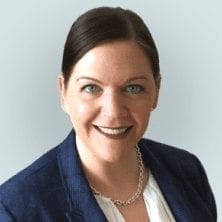
Kristen Delphos joined Dematic as Vice President and Head of Marketing & Communications in 2019. Kristen came to Dematic from ABB, where she had been VP of Communications for the Industrial Solutions business acquired from GE in 2018. She has more than 15 years of experience in developing and leading communications programs across the transportation, energy, manufacturing and consumer sectors, having held various global communications leadership roles at other Fortune-ranked companies including GE, UPS and ADT. Kristen holds a Bachelor of Arts Degree in Economics from the University of Massachusetts in Amherst, MA. Learn more about Dematic here: www.dematic.com

Will Haraway is the Chief Content Officer for Lead Coverage and the Founder & Lead Evangelist at Backbeat Marketing. Will has 20 years of executive experience in B2B Technology Marketing. Will is a certified analyst relations practitioner by the Knowledge Capital Group and has helped companies including Manhattan Associates, Aptos, Atlantix Global Systems, American Software and Rubicon Global improve their brand reputations with marketing results that help increase sales. Will also serves as a member of the APICS Atlanta Executive Advisory Board.

Ben Harris is Director of Supply Chain Ecosystem Expansion for the Metro Atlanta Chamber. Ben comes to the Metro Atlanta Chamber after serving as Senior Manager, Market Development for Manhattan Associates. There, Ben was responsible for developing Manhattan’s sales pipeline and overall Americas supply chain marketing strategy. Ben oversaw market positioning, messaging and campaign execution to build awareness and drive new pipeline growth. Prior to joining Manhattan, Ben spent four years with the Georgia Department of Economic Development’s Center of Innovation for Logistics where he played a key role in establishing the Center as a go-to industry resource for information, support, partnership building, and investment development. Additionally, he became a key SME for all logistics and supply chain-focused projects. Ben began his career at Page International, Inc. where he drove continuous improvement in complex global supply chain operations for a wide variety of businesses and Fortune 500 companies. An APICS Certified Supply Chain Professional (CSCP), Ben holds an Executive Master’s degree in Business Administration (EMBA) and bachelor’s degree in International Business (BBA) from the Terry College at the University of Georgia. Learn more about the Metro Atlanta Chamber here: www.metroatlantachamber.com
